#nina has spoken
Text
The fact that in episode 7 Ellie is at her most innocent, seeing a mall for the first time, playing videogames, taking silly pictures with her friend, getting her first kiss.
In episode 8 that innocence gets ripped away, painfully.
#the last of us#tlou hbo#tlou#tlou spoilers#hbo the last of us#the last of us spoilers#ellie the last of us#ellie tlou#pain agony even#nina has spoken#ellie williams
72 notes
·
View notes
Text
I love all six of crows fanart and everyone should make it forever, but I will note that every time I see art where Nina is shorter than Wylan I feel like I've been lightly poked in the eye
#its offputting to me. some sort of strange alternate universe#listen kaz describes nina as tall she's gotta be at least 5'10#wylan is giving mid 5s. he's clocking in at 5'7 at MAXIMUM.#in my imagination [which is correct btw] nina is like the same height as kaz. they fight about whether or not nina is taller#kaz calling nina 'tall' to me means tall for a person not just tall for a woman#they're both 5'10 so they can look each other in the eye when they fight#as a tall girl myself she has the RIGHT to be as tall as kaz IF NOT TALLER#RECALL how matthias and nina are described as the two biggest people in the group?? yeah#and dont take wylan's short king crown away from him. 5'5 5'6ish in my heart#if you must make him taller. he's 16 maybe he'll have another growth spurt and hit 5'9 one day#that's as much as i will allow. i have spoken.#nina zenik#wylan van eck#six of crows#soc#tgt#six of crows memes#soc shitpost
53 notes
·
View notes
Text
"He will arrive at the shop wearing naught, and knowing not why he is there."
"As lightning strikes, two maidens fair be made prisoners."
"The chariot of the Serpent changes hands and shines like the golden sun."
"The Archangel shall partake of earthly delights, and the Lord Of Flies shall join him, as the crickets sing their song." †
"And there shall be joy, and there shall be dancing, but 'twill not last the night, as all the hosts of Hell approach."
"The long-awaited embrace is not what it seemed to be, and all those who look on are struck with a dagger to the heart."
"An Angel bestows forgiveness to a serpent who seeks it not, and as the nightingale falls silent, a Great Sadness befalls the land."
~ Totally Real Agnes Nutter Prophecies That I Definitely Didn't Just Make Up
† "Everyday" was performed by Buddy Holly and the Crickets, in case that one confused you a bit
#the chaos duck has spoken#good omens#good omens season 2#aziraphale#anthony j crowley#good omens spoilers#ineffable husbands#good omens maggie#good omens nina#the archangel fucking gabriel#beelzebub prince of hell#the nice and accurate prophecies of agnes nutter
36 notes
·
View notes
Text
Tip Top, Thank You. Ticketyboo!
Did you all know that "tip top" is MLE slang for a blowjob?

Now that I have your attention lol, some etymological meta on The Ineffables' rather tip top use of slang and wordplay and just what it means to offer to say "thank you" in Ineffable Husbands Speak under the cut. It's absolutely ticketyboo...
When we humans who speak English refer to oral sex performed on a penis, the most common slang we use for this today is to call it "giving a blowjob." Linguistically-speaking, this term is actually relatively new and how it came to be is a truly muddled bit of etymological history. As recently as the early 1950s, the American military was innocently referring to their war planes in different publications as "blow jobs"-- meaning that the planes were well-equipped to carry out destruction. This-- and other instances like this at the time-- shows that the meaning of "blowjob" as slang for oral sex performed on someone with a penis either had not yet really evolved at all or had not yet penetrated the mainstream enough for any of the people involved in these articles (journalists, editors, four-star generals lol...) to suggest that, perhaps, a different term be used to describe these planes.
Whether or not the slang term "blowjob" is actually derived from the military... as soldiers appropriating the language of war to turn it into the language of sex has been happening since the beginning of time... or whether it arose in a different way, is still unknown. The earliest documentation of something like "blowjob" comes from sex workers in the 1930s who referred to what we call giving a blowjob as "blowing someone off." This is obviously funny now from a language evolution perspective, considering that when we use that phrase today, what we mean is that we dodged an interaction with someone, as in "I was supposed to grab coffee with my friend yesterday but I was tired so I blew him off." If you said that sentence to a Mrs. Sandwich in 1935, she'd have several follow up questions...
Further complicating the history of the term is that since the origin of "blowjob" as a term is murky, no one has ever really been very clear on which kind of "blow" is being addressed in it or if it refers to multiple kinds at once. Is it a "blowjob" because of aspects of the act of it or is it a "blowjob" because the end result is, as the military influence might suggest, that the recipient "blows", meaning comes apart/ejaculates? Either way, it's the most common way you refer to this type of oral sex in English but, as we know, different groups of people have additional slang to refer to it as well. Crowley and Aziraphale are shown in S1 to have picked up the MLE slang term for it of tip top.
MLE stands for Multicultural London English and it is what is known as a sociolect. A sociolect is a dialect that's built more out of being a part of a certain social class or group. MLE is also a multiethnolect, which means that it is a dialect derived from the influence of people of different ethnicities and backgrounds. It is the language spoken by a diverse group of working-class people, most of them younger, who live and/or work in London, and has mostly emerged since the 1980s. One of its slang words is the use of tip top to mean a blowjob. It is sometimes shortened just to top, if context in the sentence allows for the meaning to be understood as a blowjob and to not be confused with other sexual meanings around the word "top."
Tip top is an example of different dialects crossing and interweaving. MLE uses "side ting", for example, to describe sleeping with someone other than one's partner which, just like its American counterpart of "side piece", is derived from the British English phrase "bit on the side", which we also hear Nina and Crowley use in S2. In S1, Aziraphale used ticketyboo, which is Victorian-era slang that is also thought to be an example of different dialects crossing. Theories on its etymology involve a Hindi saying, a British one, and a bit of French intermixing. It is an example of Crowley and Aziraphale's interest in the ongoing evolution of language and how they weave that into their wordplay. We'll come back to ticketyboo later on. Tip top and saying thank you are up first...
Tip top is originally a British English-rooted expression meaning someone is feeling excellent or that something is in excellent shape. It refers to the tip of the top-- the highest of peaks. There is then a fun sense of humor to it being adopted from its endearing but potentially kind of stuffy British use ("How are you, my good man?"/"I am tip top, old chap! Right as rain!" lol) to becoming slang for oral sex in a dialect used by predominantly non-white, younger Londoners, many of whom emigrated to England or who come from immigrant families, particularly from countries that either still are part of or were formerly part of The British Empire. There's a top shelf, droll trolling of the colonizing British Empire happening there in the language evolution and it's also a good example of how when different cultures overlap, so too do their languages.
Crowley and Aziraphale always have to choose words that are able to remain hidden beneath the surface layer of their conversation. One of their wordplay kinks that we've observed are words that have multiple different meanings, as we looked at in other metas. Their favorites are ones with hilariously contradictory meanings that they can use to create sentences that have one meaning on the surface with one interpretation of the definitions used of the words and another entirely if the other meanings of those same words are used. They get off a bit on using common words in Ineffable Husbands Speak when speaking to others-- particularly angels and demons-- who have no idea what they're talking about because they only understand one level of meaning of the words being used and assume the context implying that one level of meaning is correct. Examples of these types of scenes: the Aziraphale one in Heaven that I'll mention again below, Aziraphale in Hell in 1.06 and then telling Crowley "I asked them for a rubber duck" to make him laugh afterwards, Crowley's "can I get a wahoo?" and what he says to Gabriel before getting into the fire in 1.06 having a different meaning in Ineffable Husbands Speak, as well as almost everything Crowley said to Muriel in the second half of S2 (the handcuff innuendo; "extremely alcoholic breakfast at The Ritz", etc..)
We've seen that some of their favorite words like this are wily (meaning sly, tricky, crafty on one level but also alluring, magically attractive, sexy on another), smitten (to be attacked by an angel with the righteous fury of God but also to be struck down with love and infatuation), and thwart (to oppose and stop but also to cross from one side to the other.)

Aziraphale called Crowley a "wily adversary" to the angels in Heaven and could barely keep a straight face because when he and Crowley say "wily" to one another, they mean it as "sexy." (As in, "he was a wily old serpent and I was technically on apple tree duty.") Crowley used "thwart" multiple times in the same scene in 1.01 as an euphemism for "fucking", as in:

(I also love that, out of all the different names the thing has, Crowley and Aziraphale call it "The Divine Plan" while flirting in this scene, since divine means "of God" or "like God" but it also is used just to mean "delightful" or "delicious," as in "the wedding was lovely-- we had a divine time!" or "mmm, gah, this cake is divine..."
Additionally, another meaning of thwart is that it's the term for the seat in a rowboat that someone would sit on to row a boat and, like we looked at in the Fish meta, Crowley and Aziraphale have their whole we-got-oysters-the-first-night-we-slept-together-so-now-everything-related-to-fish-and-the-sea-is-a-sexual-euphemism-or-metaphor thing happening. Wahoo to that sushi but anyway we're talking about blowjobs, so... *redirects self*...)
As we were talking about at the start of this meta, calling oral sex on a penis a "blowjob" is a relatively new thing but different euphemisms for it have existed forever. By the above measure for words used in Ineffable Husbands Speak, though, tip top is a tip top choice for a blowjob euphemism, old chaps, as there is just a lot of word nerdy wordplay potential there. One of the reasons why Crowley and Aziraphale use it is also one of the reasons why it has likely evolved to mean a blowjob in MLE in the first place and that is because of the innuendo inherent in a phrase involving "tip", as in the sensitive tip of the penis, which is especially humorous when added into the fact that "tip top" means "excellent." You're just hitting the tippity top when you get a tip top, no? Just reaching the highest of those climatic peaks...
The first time we hear Aziraphale use tip top is in the paintball scene at Tadfield Manor in S1. Crowley and Aziraphale are hit with the paint, Crowley shapeshifts into a roaring snake and causes a guy to pass out and his already high levels of horniness increases until he's doing the lip bite and the cute nose scrunch that screams 'do me':
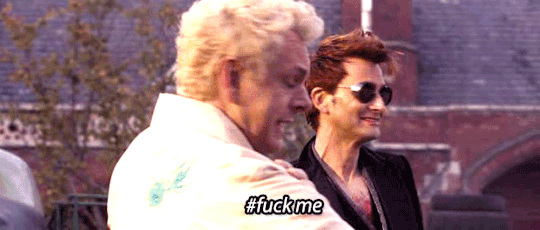
Meanwhile, Aziraphale sounds all innocent (it's faux-innocent, as it often is lol) and is going on about the paint on his coat and he says that he's "kept this coat in tip top condition for over 200 years" and starts to pout.
Crowley and Aziraphale are supernatural humanoid beings with feathers and Crowley is also a snake. They have a seemingly never-ending list of comparisons to other creatures of Earth happening and some of it trips over into their innuendo. A coat, on one level, is the coat that Aziraphale is wearing in the scene that was splattered in blue paint but... it's also a word used to describe the fur or hair of an animal.
Aziraphale has kept his coat-- the beige outer layer of his clothes-- in tip top condition-- so, in well-maintained, excellent condition-- for more than the last 200 years. Euphemistically-speaking, though... Aziraphale is referring to the apparently historically well-groomed state of his hair-- specifically, his pubic hair-- which he's always got lookin' fine and zhushed for visitors. Aziraphale keeps his coat in tip top condition because loves him the highest peaks of the tippity tops does the angel...
(Sidenote but Aziraphale has massive pubic hair thing happening, as this is not the only scene he's referred to it euphemistically. In S2, as we looked at in the meta about his dirty French, he used "plume" in its "feathered" sense to euphemistically refer to missing quality time with Lady Crowley's natural garden box.)
Is now a good time to mention Mr. Fell and the blowjob's formal name of fellatio? Fellation and fellatio are rooted in the Latin verb fellare, which means "to suck", though "to fellate" and "fellatio" became words relating to oral sex only as relatively recently as during the 1800s. The Latin verb, though, has existed basically for forever and considering Aziraphale's kind of cheeky use of Fell as his surname in reference to how while he might not have fallen to Hell in the angel/demon sense of it, he's "fallen" into "sin" of the Adam-and-Eve, food-and-sex sense of the term, one of the reasons behind choosing Fell as his surname then could be tied to the verb fellare and his penchant for giving and receiving oral sex. (And how do we know that it wasn't, say, Crowley in the 1800s who got the ball rolling on using that Latin verb to refer to a blowjob? lol) At minimum, it's too funny for Crowley and Aziraphale to have never made a joke about it at some point. Back to the paintball scene...
Crowley knows what tip top means in this scene and it's clearly already existed in Ineffable Husbands Speak for some time. His mending of Aziraphale's coat is then in an exaggerated manner involving some (magically unnecessary) blowing, visually referencing the tip top/blowjob wordplay that Aziraphale was doing to suggest that they get up to that activity soon:
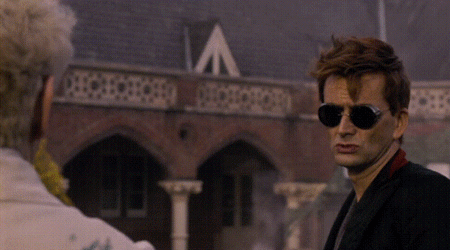
But tip top is far from the only blowjob-related term in this scene...
While this scene takes place in the 2019 present of S1, recall that I mentioned above that MLE is not that old as sociolects go. It's definitely old enough and close enough to Crowley and Aziraphale for them to know it-- and the above illustrates them using it-- but what about before MLE emerged to give them the tip top slang option? What did Crowley and Aziraphale call a blowjob in their language before the 1980s/1990s?
The paintball scene then sees them show us another euphemism for it that other scenes in the series show us that they've been using for at least a few hundred years. Let's talk about the etymology of 'thank' and what they mean when they offer to say 'thank you.'
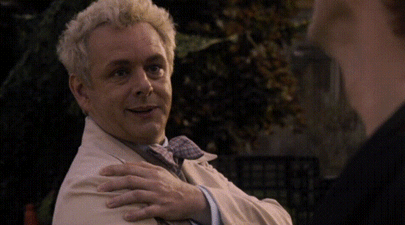
The word thank is etymologically tied to the same root words as both thought and think... which are, of course, things you do with your head. They are all rooted in the Latin tongere. The word tongue is rooted to both tongere and the Latin lingua, for languages. As a result, the words tongue, think, and thank are all linked together in their histories and, as an added bonus, are also tied to words related to languages and wordplay, which makes it all a little extra funny from hidden language/innuendo standpoint.
The other common euphemism for giving a blowjob is to refer to it as "giving head." You think with your head and use your tongue to speak but... you also use your tongue when you've got your head in your partner's lap... You bow your head to pray, which is referred to as to 'give thanks' to God... and you bow your head to make your partner feel tip top...
Oh, hello, Blasphemy Kink, Our Old Friend... 😇
In the paintball scene, Aziraphale smiles dirtily and says "oh, thank you" after Crowley mends his coat, and gives Crowley that look that says that he wants to give him a proper thank you for his help. Mrs. Sandwich in S2 picks up on the seamstress/clothing innuendo theme when she's going on suggestively about her girls' ability and willingness to mend a gentlemen's shirt, nodding back to Crowley's hollowed-cheeked bit of magical seamstressing in S1.
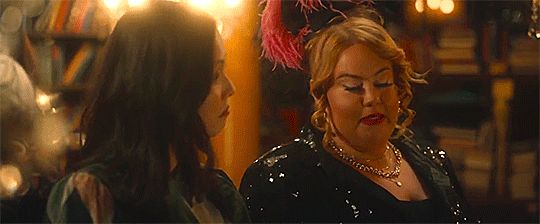
If you look at Crowley in the above Aziraphale-saying-thank-you gif, you'll notice from the movement of his head, that Crowley replied-- with a humorous tone-- the standard response to someone verbally saying "thank you" which is, of course: "You're welcome."
"You're welcome" is every bit as funny and dirty as "thank you" in this context...
First, there's that "welcome" is homophonic for both "will come" and "we'll come." Aziraphale says he wants to give thanks and Crowley replies with the assured, well, outcomes of that outpouring of gratitude. 😂 But there's also the amazing history of "welcome"...
"Welcome" is derived from combining two words in Old English: the prefix wil-, which means "desire, pleasure" and the word cuman, which means "come." Together, they also formed the word in Old English that is the origin of "welcome"-- 'wilcuma'-- which meant (I kid you not) "a person whose coming is pleasing."
Aziraphale is always very welcome, as far as Crowley is concerned lol.
The spelling evolved into "welcome" over time, thought to be influenced by the Old Norse velkominn (which is from where the modern German "welcome" of "willkommen" is derived.) Mixed in the evolution of "welcome" is also the Old French "bien venu" (which has evolved into its modern form of "bienvenue"). "Bien" in French means "good" and "venu" is of the French verb venir, which means "to come."
Obviously, the original meaning of wilcuma/welcome is in reference to hospitality of a less sexual nature. If you go to a holiday party at your aunt's house in the modern era, your aunt still might say "oh, we're so happy you could come!" and she's not referring to your ability to achieve orgasm when she says that but your ability to be able to clear your schedule and travel to her house for a party. The "come" in that sense is the same "come" in welcome/wilcuma, in that it refers to an arrival at a usually planned destination. It's from this same sense of travel, though, that language has evolved to refer to having had an orgasm as having "come." The language around orgasm contains a sense of the experience of it being a journey and a climax being a sense of arrival at the end of that journey.
It's that aspect of use of "to come" in language history and evolution that Crowley and Aziraphale are using as innuendo where it overlaps with even some of the most common things we say all the time-- "thank you" and "you're welcome." They are also on a road trip in the paintball scene when they break out the innuendo around giving thanks, so the travel-related wordplay has another layer to it. They actually have a lot of innuendo around travel and forms of transportation and where those overlap in language related to sex that we could look at it in another meta that I'll probably inevitably end up calling 'Travel Sweets'... 😉
This is why, with the exception of the "thank you"/"you're welcome"s in the paintball scene-- when they're both already giving each other fuck me eyes all over the place-- the scenes in which we see either of them saying the words "thank you" to one another are, so far, always posed as questions regarding whether or not they should 'say thank you' in that moment instead of just saying the words 'thank you' aloud, which adds to the idea of 'thank you' being euphemistic. The scenes show them asking if thanks should be said instead of just saying it because when they ask if they should 'say thank you', they are really asking if the other wants a blowjob.
Such as, in 1793:
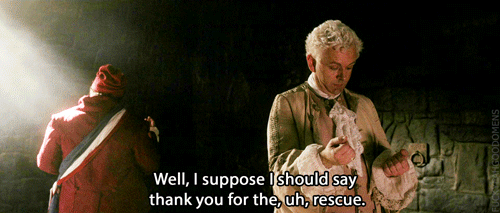
Aziraphale was legit going to blow Crowley right there but Crowley was looking to get the fuck out of the rapey torture cell first. I'm sure he was amenable to the angel giving thanks after some crepes, though... and 174 years later, in 1967:
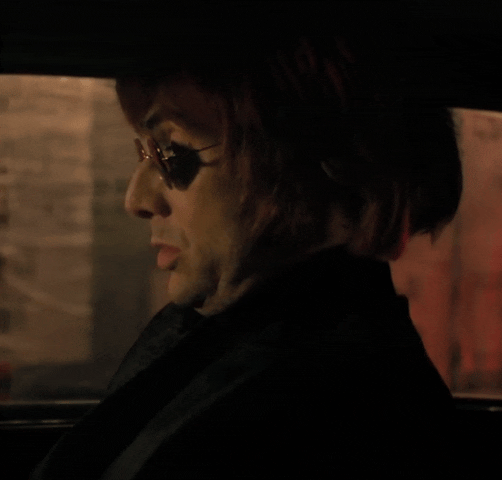
This one is particularly interesting from an euphemistic standpoint because Aziraphale had just given Crowley Holy Water, which is a bit akin to Beez's fly in S2, in that it's something his body is capable of making. It's his holiness as an angel that allows him to bless water and turn it from water into Holy Water which is, ironically, a substance that could kill Crowley, who has otherwise been drinking Aziraphale's holy water for quite some time by 1967 and who then replies to Aziraphale giving him actual Holy Water with the suggestion that he bow his head and pray a little over his communion font of a partner.
The other bit of this is that, even though they're alone in this instance, they're speaking on multiple layers as if they are not, which they do not always do when they're alone but which we have seen that they've evolved into feeling more comfortable doing sometimes when it comes to more intense conversations. (2.06 is a great example of just how much more comfortable they are speaking in their own language because of how they both try to run to it within a minute of trying to abandon it. A conversation that starts out trying to be more plain-spoken has Crowley invoking nightingales code by the end of it.)
Crowley really is asking Aziraphale if he should say thank you in 1967-- if he should say the words-- as well as the euphemistic layer to what he's saying here because he's surprised and moved and he doesn't know what to say. The choice to phrase it like that, though, and to also include the euphemistic meaning of saying thank you, is also intentional. They keep it up throughout the whole conversation-- "I'll give you a lift, anywhere you want to go" and Aziraphale's "go for a picnic" and "dine at The Ritz" are as literal as they are euphemistic, as everything else in their language is.
There is one other scene where tip top returns, though, and it is during this moment here:

Crowley and Aziraphale have driven back from Tadfield. From conversation had in previous scenes on the way, Crowley might have been planning on staying at the bookshop for awhile when they got back and Aziraphale wanted that. But then, as he's getting out of The Bentley, Aziraphale spotted that Anathema had left Agnes Nutter's book in the backseat and then had his whole moment of trying to rush into the bookshop alone to read the book without telling Crowley what was going on. Crowley asked if he was alright and Aziraphale replied:
"Perfectly, yes. Uh, tip top. Absolutely tickety-boo! Mind how you go!"
Aziraphale is anxious to get inside and be alone with the book but his words, if stressed, are structured to try to sound reassuring to Crowley that, even if he seems outwardly anxious, he's not upset with Crowley himself over anything, even if he's basically telling him to go home when, most nights, the assumption would be that he could stay a bit. He's tossing bits of wordplay at Crowley while running for the door. Perfectly/Perfect is from the Latin perfectus, which is combined of per-, meaning "through; completely" and facere, meaning "do." Perfect, as a result, can mean "done completely" in etymologically-based innuendo. If Aziraphale is then also referencing tip top here again and adding in perfectly, the suggestion seems to be that they pulled over to say thank you on the way home from Tadfield. Aziraphale is using it as an excuse to not invite Crowley in for more by trying to say he's completely done as a result and needs to be alone and nothing to see here, Crowley, nothing unusual, not at all acting weird and out of the ordinary! Aziraphale is absolutely ticketyboo...
Ticketyboo is Victorian-era slang and, despite Aziraphale wearing clothes from the 1800s constantly, we don't actually hear him use a lot of slang from the Victorian era or the rest of the 1800s still in modern times, which is a bit surprising. (And also disappointing as Victorian slang is amazing.) Aziraphale is actually a lot more current with his language than he is with any other aspect of his life, which is pretty interesting from a characterization standpoint... but which also makes his use of ticketyboo more interesting, though, as a result.
Ticketyboo means "everything is great." Its etymology is a little uncertain but it is thought to be a mashup of the Hindi phrase "thik hai" and the British English saying "that's the ticket," with the two phrases crossing back and forth between dialects of British officers stationed in India and both the people in India with whom they interacted and people originally from India who emigrated to London and interacted with British people there.
"Thik hai" means "it's alright" while "that's the ticket" has a pair of positive meanings. It can reflect the good feeling when something that is morally right, just and good has either happened or been suggested, as in: "Jury selection has finally fucking begun in one of the 1400 Donald Trump criminal trials-- that's the ticket!" It also can be used as an expression of pleasure, as in: "Jury selection has finally--" (just kidding though I would also count that as pleasurable lol)... as in: you take a sip of coffee first thing in the morning after a difficult night sleeping and sigh "oh, that's the ticket"... or your partner gets that knot out from under your shoulder blade-- "ahh, that's the ticket..." It's something that feels right and good.
But there's one other part of ticketyboo to consider, and that's the 'boo' part. The etymology of this bit, in particular, is muddled but what is interesting here is that while the word became ticketyboo-- all one word-- it is thought to actually have originally been spoken as two words: "tickety, boo." The 'thik hai/that's the ticket' part refers to the 'tickety' part of the word... so, what about the 'boo' part?
The general idea to date is that 'boo' evolved from 'bo' and that 'bo' is mixed into it because of homophonic overlap with the French word from which it is thought to have evolved-- 'beau.' The reason why this is thought to be part of the history of ticketyboo is that MLE has some overlap with AAVE (African-American Vernacular English) in the United States and, since roughly sometime in the 1980s, "boo" has been a gender-neutral term of endearment for someone's partner that originated in AAVE, exists in MLE, and has since spilled over into mainstream American slang.
'Beau' means "handsome" in French and it is, as you probably know, also an old-fashioned term for a boyfriend or a male admirer. It referred to a suitor who was romantically pursuing a woman-- bringing her flowers (and chocolates, when she opened a bookshop in particular lol), picking her up in his car and taking her on dates... courting her, as it used to be called. You might have a boyfriend but your great or great-great grandmother would have had a beau.
It's from this term that the more modern "boo" has arisen. Someone's boo in our modern times is their romantic partner of any gender and not necessarily someone with whom you are still in a courtship stage but can also refer to a spouse or a partner with whom you are in a committed relationship.
As a result, the reason why Aziraphale might be using ticketyboo in 2019 when he has stopped most of the rest of the great Victorian slang he undoubtedly misses is not necessarily because he's randomly using fusty old language because he's stuck in the past. It could actually be because he is using old slang that Crowley also remembers in a modern way in their wordplay in the present, referencing where it overlaps with the more current slang with which it shares an origin.
Aziraphale is not so much just saying "ticketyboo" as much he's also saying its origins of "tickety, boo" and referencing boo/beau to both refer to Crowley as handsome and as his boyfriend/partner within the full history of the one word of "boo" that he says.
Aziraphale's response to Crowley asking if he's alright then becomes akin to basically this, from a wordplay standpoint:
Yes, perfectly! Just worn out from the day, am in tip top shape from that tip top though haha! Not at all looking cagey and nervous nope nothing to fret about everything is absolutely fine, not to worry, my weirdness right now is not about you! You're just the lovely ticket as you always are. Good night now, my handsome boo. Do be safe getting home.
Crowley was understandably, though, thoroughly confused by this because Aziraphale dropped ticketyboo while acting weird and not letting him come inside for a nightcap and at least a little canoodle but Aziraphale's weirdness was worth it for listening to Crowley sound out the term-- "TiCKeTyboo?"-- while trying to math out what had gotten into his angel. I think he called me his handsome boyfriend while having a nervous breakdown. Weird, but also probably in character...

On a darker note? Look at how much the ticketyboo scene is a more light-hearted version of the end of 2.06, in a way. Aziraphale sees the book that can stop the end of the world but he doesn't tell Crowley about it-- just as how Aziraphale learned of The Second Coming from "The Metatron" but instead of crossing the street to tell Crowley who, again, was standing beside The Bentley, Aziraphale keeps the information to himself and goes inside, shutting the door, leaving Crowley standing in the street for a moment before he gets in the car and drives off. Just an observation, not sure yet exactly how it would all fit together, but we'll see in S3...
I want to go back to talking about "giving thanks" for a moment because we have to look at one, other scene that's very relevant to this and it's this one:
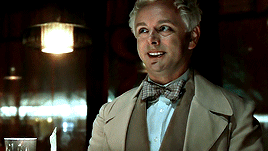
In 1.01, we are reintroduced to Aziraphale after the scene on the wall in Eden and the time jump of thousands of years. The very first thing we ever see him do is thank his friend for preparing the sushi he was planning on enjoying with the delayed-by-Hell Crowley. We see Aziraphale bow his head over the food and say "arigato"-- Japanese for "thank you"-- before starting his meal. Ojigi-- the tradition of bowing out of a sign of respect in polite society in Japan-- is a sign of reverence and, in situations like the one in which Aziraphale bows, is an expression of gratitude. Here's Aziraphale showing a devout sense of reverence to the skills of the human chef who prepared for him a meal he's going to enjoy with a pleasure that overlaps with sexual pleasure and that is his form of prayer before the meal. He and Crowley worship more at the altar of humanity and in ways that tie closer to an Eastern sense of spirituality than in devotion to those of a monotheistic God.
Pagans of The Good Times, as a certain Irish God with a song on Crowley's official playlist calls it. Hungry work...
Because, in addition to the general sense of a definition of prayer being "to give thanks to God," there is also Grace, the traditional prayer said at the start of a meal to thank God for the blessings of the food on the table. Crowley and Aziraphale's hidden language when it comes to sex is entirely structured around food as a result of the apple, the ox ribs and, eventually, the oysters. Alcohol, bread, fish...they've got a real water-to-wine, loaves-and-fishes, and fuck- Leviticus-sideways thing going on lol... so it is deliciously dirty and very funny that they developed euphemisms for giving each other a blowjob that are related to saying grace by bowing their heads in prayer and giving thanks.
For the food they they about to eat in S3, may The Voice of Frances McDormand make them truly grateful. Amen.

#ineffable husbands#aziracrow#good omens#crowley#aziraphale#good omens meta#good omens 2#ineffable husbands speak#etymology
192 notes
·
View notes
Text
Six of Crows Russian Edition
Today I found this gorgeous gem at the bookstore!
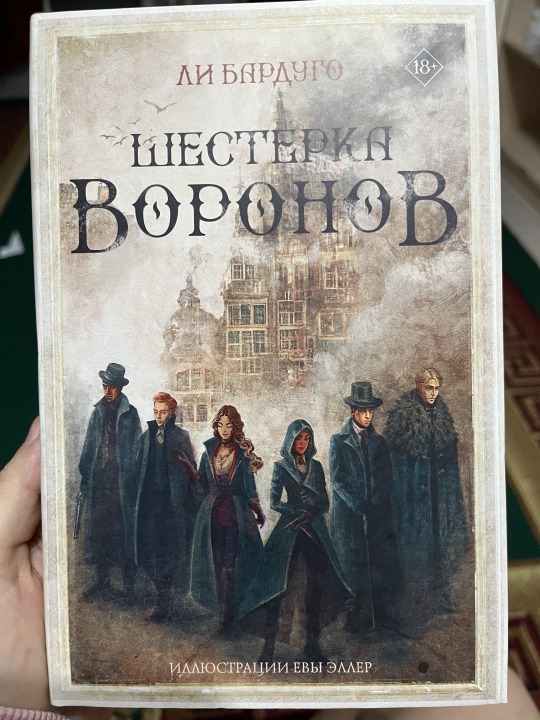

So a few years ago I moved overseas to live in a Russian speaking country. I am not in Russia, for the record. The national language here is not Russian, but it is commonly spoken in my city.
Today at the bookstore I looked for a copy of Crooked Kingdom for the cast of Shadow and Bone to sign this May when I go to A Storm of Shadows and Crows convention in Paris. I don't own a copy of SOC or KC in English and there's no chance of finding one where I live. The next best option was getting a book in the local language and calling it a souvenir of my time abroad. To my delight I found this lovely Russian edition of Six of Crows!
More stunning artwork below.
There were multiple versions of the books to choose from. The original art and the Netflix artwork were available too. The most impressive part was finding copies of the original covers WITHOUT the Netflix sticker. (Haha, suck it Netflix.) To the right, not pictured were King of Scars and Rule of Wolves.
I've never seen this cover variation before. It was an exciting find!
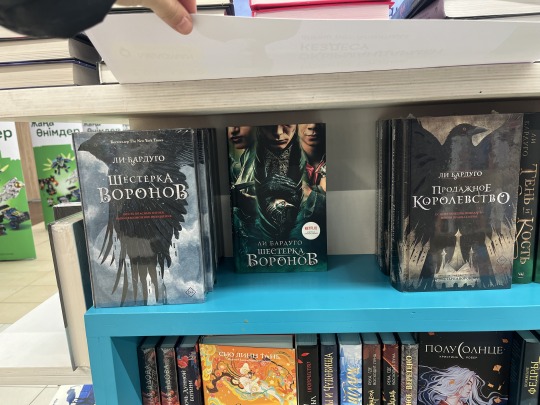
The Russian version I bought is illustrated by (I assume Russian?) artist Eva Eller.
I didn't see a copy of Crooked Kingdom with illustrations by the same artist at this bookstore, but it must exist. Mine was the last copy of SOC with the Russian artwork. Maybe it was sold out?
Google Translate titles the book Six of Ravens, lol. But that's just a translation error because a little google-foo showed that ворона (pronounced vorona) means crow. Interestingly, while typing the title, I learned that вор (pronounced vor) means thief. Interesting how similar the words crow and thief are in Russian. Checks out.

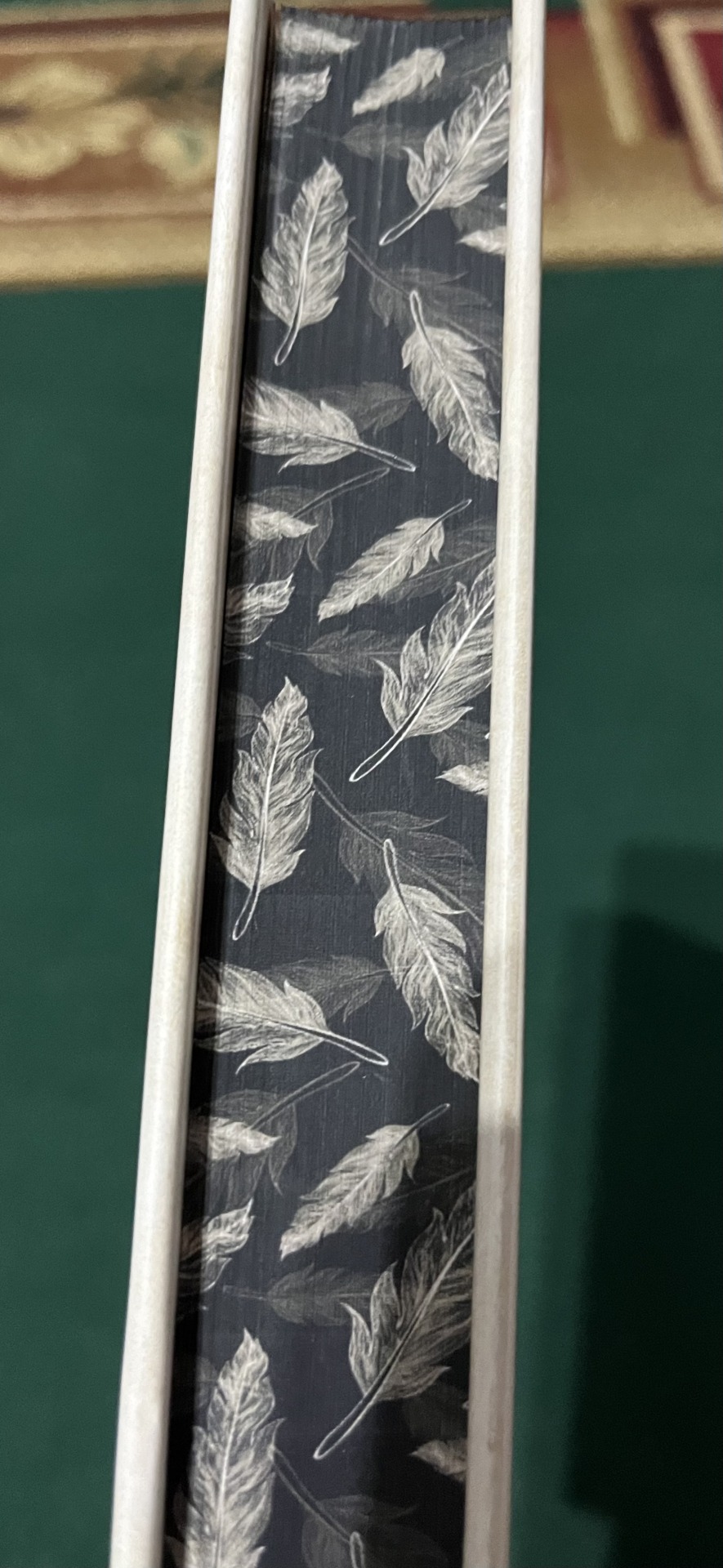
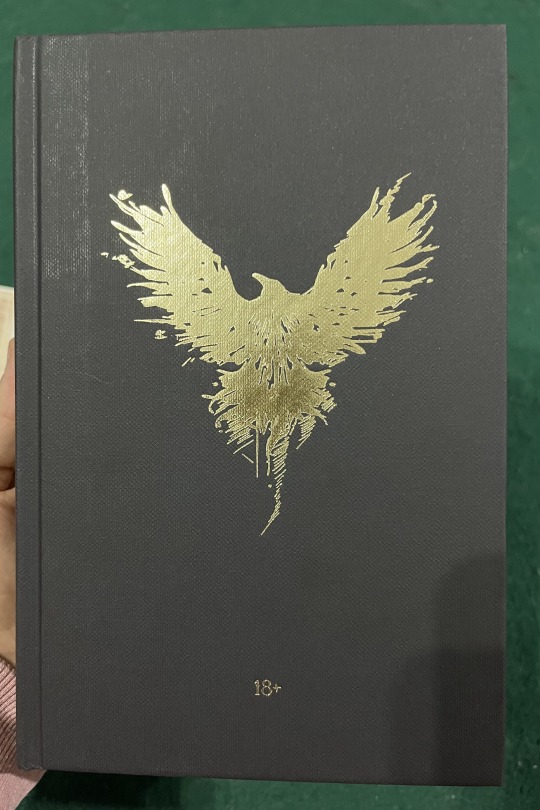
Above is the art printed on the side of the pages. Love how it still includes the side of the pages colored, just like the original books.
The hardcover underneath the jacket is a crow. It's not the same as pictured on the original CK cover, but it is similar. Love the messy, broken, bent feathers, yet the crow is still able to fly. Metaphor for our six characters? Absolutely!
The book was wrapped in cellophane so I didn't realize there was even more art inside! Here is the inner cover. IT'S BEAUTIFUL! The back is the same. It captures the foggy haze of Ketterdam so well.
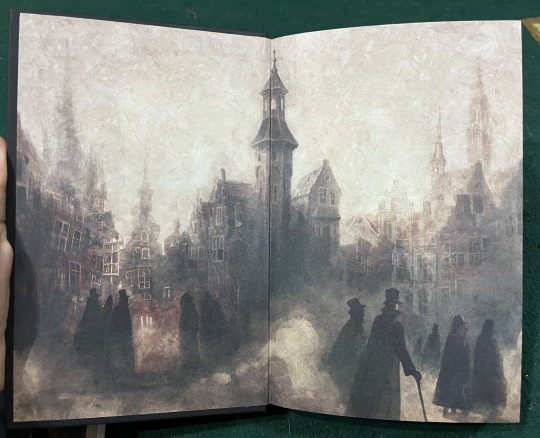
The flaps of the book jacket are images from the inner cover. But there's a cracked texture over them that gives it a gorgeous grittiness.
The candle is the left side of the inner book jacket. Sorry the image isn't flat, I didn't want to damage the jacket by straightening it out.
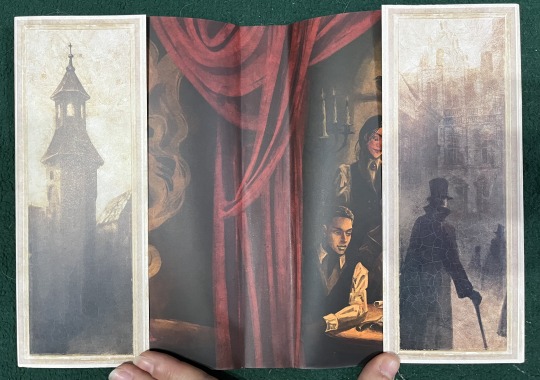

The right side of the book jacket shows all the Crows!
Let's appreciate how Matthias looks snow pale and serious. Inej is taller than Nina -- she must be standing on a step stool. No clue why both of their eyes are closed, especially when Nina is the one pointing to the paper. They are lovely. Kaz has on his scheming face. Jesper is as handsome as every version of him should be. And Wylan looks bored AF because A.) he's already memorized the map he drew or B.) he can't read whatever document Kaz has in front of them. Wait, no, Wylan is making heart eyes at Jesper. All of the above can be true.

Inside is a small illustration at the beginning of each chapter, which changes with each section.


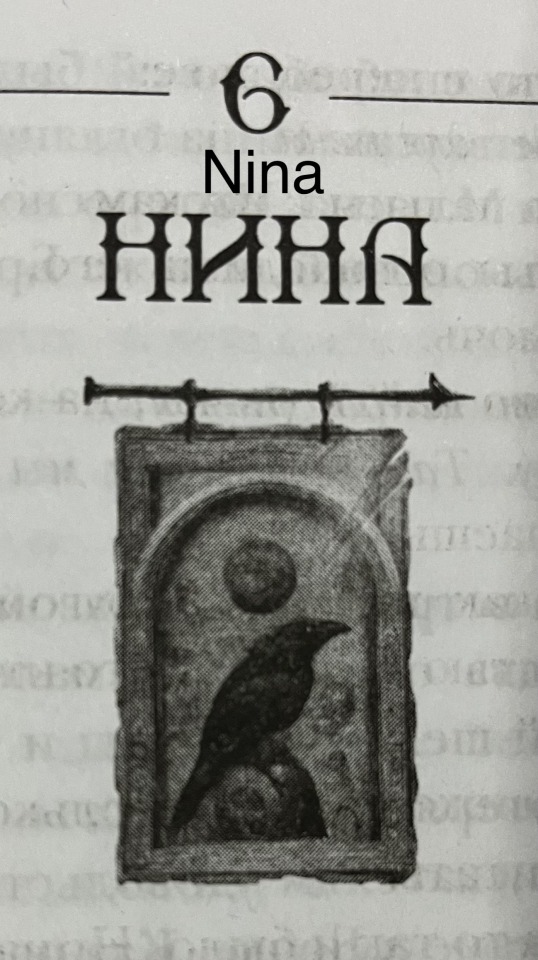
You can also see the Crow's names written in Cyrillic. Inej, Kaz, Nina, and Matthias translate easily. Jesper uses the д (letter D) and ж (pronounced like zhe) letter combination that makes his name sound like Zhesper since there is no J in Cyrillic. It's worth pointing out (again) that Wylan's name does not translate perfectly. There is no W in the Cyrillic alphabet. (As someone who also has a W in their name, I sympathize with Wylan here.) I'm no expert in Russian, but I'm pretty sure -- with the help of google translate -- that Wylan is pronounced as Oo-ai-len. Poor boy can't catch a break.

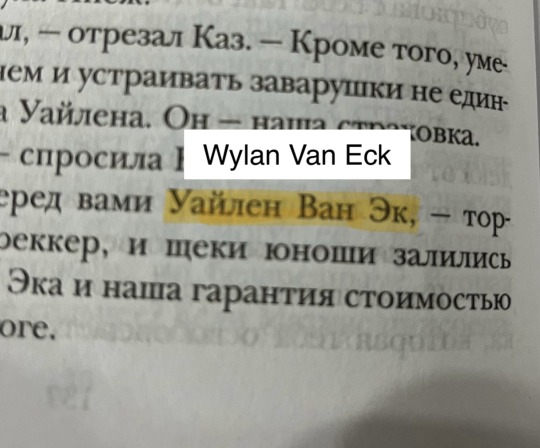
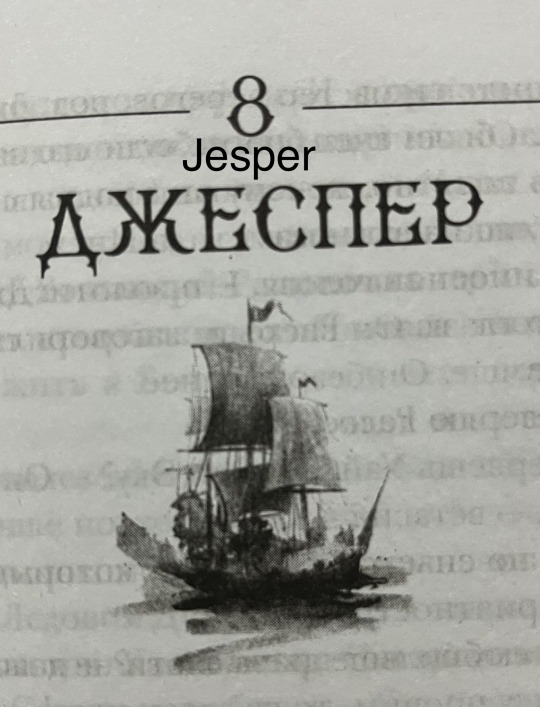
Each of the five section of the book use different chapter art. They all do an excellent job capturing the atmosphere.
The paper is so thin that you can easily see the printing on the opposite side. Not ideal for an edition that's otherwise this lovely. Oh well.
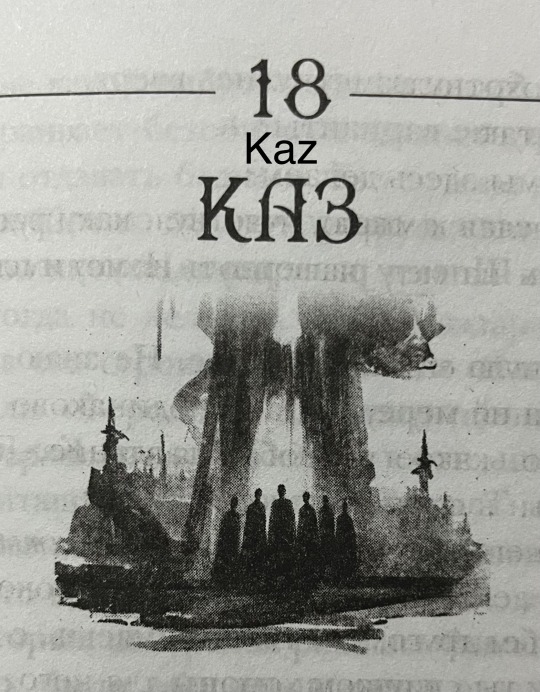


Given that Ravka is fantasy Russia, it's not a surprise to find the Grisha Verse books in Russian.
I am so excited to bring this book to Paris for the cast to sign!
260 notes
·
View notes
Text
Paradise Lost: How John Milton's 1667 work influenced "Hazbin Hotel"
I've been thinking about why the "fruit of knowledge" in Hazbin Hotel is depicted as an apple, as opposed to another fruit that would've been more accurate to the Middle East during the Fall of Man, as well as how Paradise Lost by John Milton (1667) influenced the show.
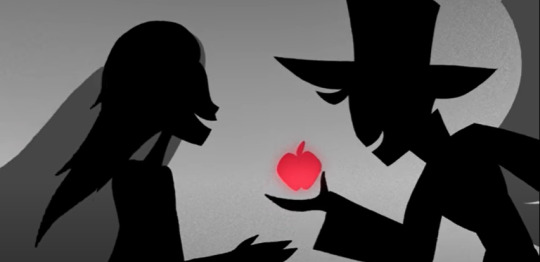
Per one source:
"Because the Hebrew Bible describes the forbidden fruit only as 'peri', the term for general fruit, no one knows [what exactly type of fruit it was]. It could be a fruit that doesn't exist anymore. Historians have speculated it may have been any one of these fruits: pomegranate, mango, fig, grapes, etrog or citron, carob, pear, quince, or mushroom."
Per Wikipedia:
"The pseudepigraphic Book of Enoch describes the tree of knowledge: 'It was like a species of the Tamarind tree, bearing fruit which resembled grapes extremely fine; and its fragrance extended to a considerable distance. I exclaimed, How beautiful is this tree, and how delightful is its appearance!' (1 Enoch 31:4)."
In Jewish and Islamic traditions, the "fruit of knowledge" is commonly identified with grapes. The Zohar explains that Noah attempted (but failed) to rectify the sin of Adam by using grape wine for holy purposes. Today, the "Noah grape" is still used to make white wine.

Furthermore:
"The association of the pomegranate with knowledge of the underworld as provided in the Ancient Greek legend of Hades and Persephone may also have given rise to an association with knowledge of the 'otherworld', tying-in with knowledge that is forbidden to mortals. It is also believed Hades offered Persephone a pomegranate to force her to stay with him in the underworld for 6 months of the year. Hades is the Greek god of the underworld, and the Bible states that whoever eats the forbidden fruit shall die."
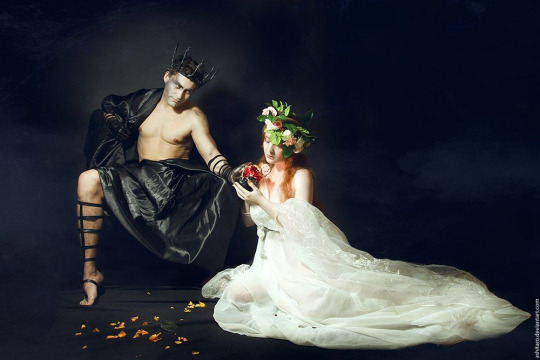
So, how then did the apple become the foremost symbol of the "fruit of knowledge"? You can partly thank Paradise Lost by English poet John Milton, a work which the lore of Hazbin Hotel is based off of.
Milton published the book in 1667, a time when the hedonistic Restoration era was in full swing. The exiled King Charles II was restored to the throne as King of England in 1660, and was a party animal, with dozens of mistresses, and nicknamed both the "playboy prince" and "Old Rowley", the latter after his favorite lustful stallion.
However, the association of the "fruit of knowledge" began with a Latin pun long before Milton immortalized the association in Paradise Lost. Per the linked article above by Nina Martyris for NPR:
"In order to explain, we have to go all the way back to the fourth century A.D., when Pope Damasus ordered his leading scholar of scripture, Jerome, to translate the Hebrew Bible into Latin. Jerome's path-breaking, 15-year project, which resulted in the canonical 'Vulgate', used the Latin spoken by the common man. As it turned out, the Latin words for evil and apple are the same: 'malus'.
[...] When Jerome was translating the 'Tree of the Knowledge of Good and Evil', the word 'malus' snaked in. A brilliant but controversial theologian, Jerome was known for his hot temper, but he obviously also had a rather cool sense of humor.
'Jerome had several options,' says Robert Appelbaum, a professor of English literature at Sweden's Uppsala University. 'But he hit upon the idea of translating 'peri' as 'malus', which in Latin has two very different meanings. As an adjective, 'malus' means 'bad' or 'evil'. As a noun it seems to mean an apple, in our own sense of the word, coming from the very common tree now known officially as the 'Malus pumila'. So Jerome came up with a very good pun.'
The story doesn't end there. 'To complicate things even more,' says Appelbaum, 'the word 'malus' in Jerome's time, and for a long time after, could refer to any fleshy seed-bearing fruit. A pear was a kind of 'malus'. So was the fig, the peach, and so forth.'
Which explains why Michelangelo's Sistine Chapel fresco features a serpent coiled around a fig tree. But the apple began to dominate Fall artworks in Europe after the German artist Albrecht Dürer's famous 1504 engraving depicted the First Couple counterpoised beside an apple tree. It became a template for future artists such as Lucas Cranach the Elder, whose luminous Adam and Eve painting is hung with apples that glow like rubies.
Milton, then, was only following cultural tradition. But he was a renowned Cambridge intellectual fluent in Latin, Greek and Hebrew, who served as secretary for foreign tongues to Oliver Cromwell during the Commonwealth. If anyone was aware of the 'malus' pun, it would be him, and yet he chose to run it with it. Why?
Appelbaum says that Milton's use of the term 'apple' was ambiguous. 'Even in Milton's time the word had two meanings: either what was our common apple, or, again, any fleshy seed-bearing fruit. Milton probably had in mind an ambiguously named object with a variety of connotations as well as denotations, most but not all of them associating the idea of the apple with a kind of innocence, though also with a kind of intoxication, since hard apple cider was a common English drink.'
It was only later readers of Milton, says Appelbaum, who thought of 'apple' as 'apple', and not any seed-bearing fruit. For them, the forbidden fruit became synonymous with the 'malus pumila'. As a widely read canonical work, 'Paradise Lost' was influential in cementing the role of apple in the Fall of Man story."
To tie this back into John Milton's relationship with King Charles II of England, as mentioned, Milton originally served Oliver Cromwell, Lord Protector of England, and the English Commonwealth, which was formed with the overthrow and execution of King Charles I on 30 January 1649, following the bloody English Civil War (1642 – 1651).
The King's two sons - the newly-christened King Charles II, the elder, and James, Duke of York (King James II), the younger - fled into exile on the European continent. However, with the death of Oliver Cromwell on 3 September 1658 came the 2-year-long dissolution of the English Commonwealth, and the restoration of the monarchy.
As for Milton himself, we can look to an article by Bill Potter.
Milton, born on 9 December 1608, was around 51-52 years old when King Charles II was restored to the throne. He attended Christ's Church, Cambridge in his youth, and mastered at least six languages, as well as history and philosophy; making him, perhaps, the most knowledgeable poet in history. He spent more than a year travelling across Europe, conversing with and learning from intellectuals, linguists, poets, and artists, including the famous Galileo Galilei.
However, Milton was a controversial figure of his time, being unafraid to criticize institutions of authority; arguing that "divorce was Biblical", for which he was routinely condemned; joining the Puritans; penning the Areopagitica, a treatise on liberty in favor of Parliament and the Roundhead rebels, during the reign of King Charles I, arguing that the King must be held accountable by the people; and agreed with and justified the murder of King Charles I, for which Parliament hired him in 1649 as a propagandist and correspondence secretary to foreign powers, on account of his fiery manifestos against "the man".
The collapse of the Commonwealth with the death of Oliver Cromwell in 1658 did not deter Milton from continued political writing against the monarchy and the new public sentiment that brought about its Restoration under King Charles II in 1660. On the contrary, Milton - now totally blind, having lost his eyesight by the age of 44 in 1652, a decade earlier - began writing Paradise Lost in 1661, and spent the next six years dictating the work to transcribers.
A supporter of regicide, Milton was also forced into exile himself, and faked his own death, as Charles refused to pardon - and sought to execute - any of those directly involved with his father's murder. Milton's friends held a mock funeral for Milton on 27 August 1660, just months after the coronation of King Charles II on 23 April 1660.
King Charles II commented that he "applauded his [Milton's] policy in escaping the punishment of death [execution for treason] by a reasonable show of dying", but insisted on a public spectacle nonetheless by having Milton's writings burned by the public hangman.
After eventually obtaining a general pardon from King Charles II, Milton was imprisoned, and released, likely due to political friends in high places. He died, aged 64, in 1674. His theological views were sometimes considered heterodox by the best Puritans, and his political views came close to getting him executed on several occasions. His poetry, however, has endured as some of the greatest works in the English language, especially Paradise Lost; much of his greatest work was written during his 22 years of complete blindness.
One of the main factors in King Charles II deciding to grant a pardon to Milton was, ironically, Paradise Lost. While originally written by Milton as a scathing criticism of King Charles II and the monarchy - depicting Lucifer Morningstar as a sympathetic rebel against God, with King Charles II claiming that is right to rule came from "divine ordainment" - Charles II enjoyed the work, and authorized its publication on 20 August 1667. We know this because a 1668 copy of Paradise Lost in royal bindings by Samuel Mearne, bound lovingly in a fine red leather made of goat skins tanned with sumac, and stamped in gold with the royal cypher of King Charles II, was found. The endpapers bore a watermark with the royal arms of Charles II.
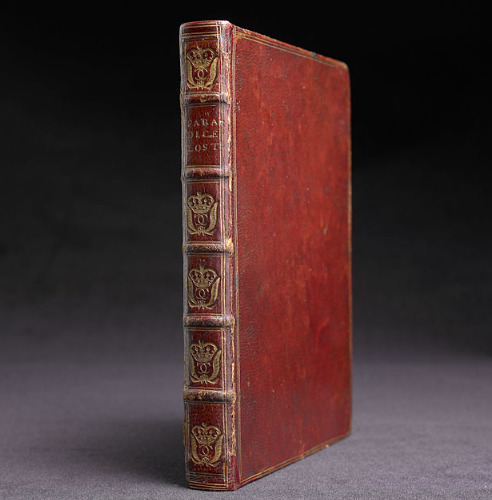
Per one Miltonian scholar: "The most single important event in Milton's life was the event against which he struggled most: the Restoration of Charles II, [and his relationship with the King]. Had it not come, we might have never had Paradise Lost...certainly, we should never have had [it] in [its] present power and significance."
Milton followed up Paradise Lost with Paradise Regained in 1671, three years before his death, with advice for King Charles II, urging the hedonistic Charles to "reign over himself and his passions":
"For therein stands the office of a King, His Honour, Vertue, Merit and chief Praise, That for the Publick all this weight he bears. Yet he who reigns within himself, and rules Passions, Desires, and Fears, is more a King; Which every wise and vertuous man attains: And who attains not, ill aspires to rule Cities of men, or head-strong Multitudes, Subject himself to Anarchy within, Or lawless passions in him which he serves." - John Milton, Paradise Regained, Book II, lines 463-472
To summarize: "If we must have a King back again, my Lord, please try to be a good man, unlike your father, who fell to his pride, [which was also the downfall of Lucifer]."
To quote another source: "Though the passage begins by noting that the office of a King is to bear the weight of public concerns, it is the control of one's private concerns that truly set a King apart as a virtuous character. Indeed, so important is self-command that any wise or virtuous man who attains it is like a king; any king who does not practice [self-command] is nothing more than a mere subject, ruled by anarchy and lawlessness."
Milton's words, too, echo a work written by Charles' grandfather, King James VI/I of Scotland and England: Basilikon Doron ("Royal Gift").
Per Wikipedia:
"'Basilikon Doron' (Βασιλικὸν Δῶρον) means 'royal gift' in Ancient Greek, and was written in the form of a private letter to James' eldest son, Henry, Duke of Rothesay (1594–1612). After Henry's death, James gave it to his second son, Charles, born 1600, later King Charles I. Seven copies were printed in Edinburgh in 1599, and it was republished in London in 1603, when it sold in the thousands.
This document is separated into three books, serving as general guidelines to follow to be an efficient monarch. The first describes a king's duty towards God as a Christian. The second focuses on the roles and responsibilities in office. The third concerns proper behaviour in daily life.
As the first part is concerned with being a good Christian, James instructed his son to love and respect God as well as to fear Him. Furthermore, it is essential to carefully study the Scripture (the Bible) and especially specific books in both the Old and New Testaments. Lastly, he must pray often and always be thankful for what God has given him.
In the second book, James encouraged his son to be a good king, as opposed to a tyrant, by establishing and executing laws as well as governing with justice and equality, such as by boosting the economy. The final portion of the Basilikon Doron focuses on the daily life of a monarch.
All of these guidelines composed an underlying code of conduct to be followed by all monarchs and heads of state to rule and govern efficiently. James assembled these directions as a result of his own experience and upbringing. He, therefore, offered the 'Basilikon Doron' ('Royal Gift') to his son, with the hope of rendering him a capable ruler, and perhaps to pass it down to future generations.
Overall, it repeats the argument for the divine right of kings, as set out in 'The True Law of Free Monarchies', which was also written by James. It warns against 'Papists' (Roman Catholics) and derides Puritans, in keeping with his philosophy of following a 'middle path', which is also reflected in the preface to the 1611 King James Bible. It also advocates removing the Apocrypha from the Bible."
King James VI/I further instructed his son and grandson:
"A good monarch must be well acquainted with his subjects, and so it would be wise to visit each of the kingdoms every three years."
"During war or armed conflict, he should choose old-but-good captains to lead an army of young and agile soldiers."
"In the court and the household, [a royal] should carefully select loyal gentlemen and servants to surround him. When the time came to choose a wife, it would be best if she were of the same religion and had a generous estate. However, she must not meddle with governmental politics, but perform her domestic duties."
"As for inheritance, to ensure stability, the kingdom should be left to the eldest son, not divided among all children."
"Lastly, it is most important...that [a royal] would know well his own craft...to properly govern over his subjects. To do so, [one] must study the laws of the kingdom, and actively participate in the council. Furthermore, [one] must be acquainted with mathematics for military purposes, and world history for foreign policy."
"[A royal] must also not drink and sleep excessively. His wardrobe should always be clean and proper, and he must never let his hair and nails grow long. In his writing and speech, he should use honest and plain language."
King James VI/I further supplemented Basilikon Doron with a written treatise titled The True Law of Free Monarchies: Or, The Reciprocal and Mutual Duty Between a Free King and His Natural Subjects.
"It is believed King James VI/I wrote the tract to set forth his idea of absolutist monarchism in clear contrast to the contractarian views espoused by, among others, James' tutor George Buchanan (in 'De Jure Regni apud Scotos'), [which] held the idea that monarchs rule in accordance of some sort of social contract with their people. James saw the divine right of kings as an extension of the apostolic succession, as both not being subjected by humanly laws."
Milton's own Areopagitica was a follow-up on De Jure Regni apid Scotos by George Buchanan, and also to The True Law of Free Monarchies, as well as the idea of the "divine right of kings". It takes its title in part from Areopagitikos (Greek: Ἀρεοπαγιτικός), a speech written by Athenian orator Isocrates in the 4th century BC.
Most importantly, Milton also wrote on the concept of free will: "Milton's ideas were ahead of his time in the sense that he anticipated the arguments of later advocates of freedom of the press by relating the concept of free will, and choice to individual expression and right."
The concept of free will, too, was a major topic explored in Paradise Lost. Per one source: "In 'Paradise Lost', Milton argues that though God foresaw the Fall of Man, he still didn't influence Adam and Eve's free will. [...] God specifically says that he gives his creatures the option to serve or disobey, as he wants obedience that is freely given [or chosen], not forced. Some critics have claimed that the God of the poem undercuts his own arguments; however, Milton did not believe in the Calvinistic idea of 'predestination' (that God has already decided who is going to Hell and who to Heaven), but he often comes close to describing a Calvinistic God. God purposefully lets Lucifer (Satan) escape Hell, and sneak past Uriel into the Garden of Eden, and basically orchestrates the whole situation so that humanity can be easily ruined by a single disobedient act. In describing the Fall of Man before it happens, God already predicts how he will remedy it, and give greater glory to himself by sending his Son [Jesus Christ] to die, and restore the order of Heaven."
In Hazbin Hotel, Adam also describes the Calvinistic idea of 'predestination', and that "the rules are black and white":

However, "This possible predestination leads to the theory of the 'fortunate fall', which is based on Adam's delight at learning of the eventual coming of the Messiah [from his bloodline]. This idea says that God allowed the Fall of Man, so that he could bring good out of it, possibly more good than would have occurred without the Fall, and be able to show his love and power through the incarnation of his Son. In this way, the free will of Adam and Eve (and Lucifer/Satan) remains basically free, but still fits into God's overarching plan."
However, there is one major flaw with this, and that is that we don't know if Jesus Christ exists within the Hazbin Hotel universe or not. Yet Charlie Morningstar, the daughter of Lucifer Morningstar and Lilith, and the "Princess of Hell", is depicted as a savior-esque figure within the show who, like God in Paradise Lost, encourages lowly sinners to choose obedience to God out of their own free will. More interestingly, Charlie does not come from Adam's bloodline; yet, while Lucifer decries 'free will', Charlie supports 'free will' instead.
Perhaps is is merely because Charlie, being the daughter of Lucifer and Lilith, claims to want to fulfill Lilith's "dream" of humanity being empowered in Hell ("The mind is its own place, it can make Heaven out of Hell, or Hell out of Heaven" - Lucifer, Paradise Lost); however, I think it also stems from Charlie having a genuine belief that 'free will', and people choosing to do good instead of evil, is "good" and "Godly".
True to Paradise Lost, this is also in fulfillment of God's plan; and, according to one fanfiction, why God allowed Charlie to be born to Lucifer and Lilith, so that sinners may be redeemed through Charlie.
For more on differing interpretations of 'free will', I suggest reading: "Free Will and the Diminishing Importance of God's Will: A Study of Paradise Lost and Supernatural" by Kimberly Batchelor (2016)
Excerpt: "'Paradise Lost' –and Milton’s purpose for writing the poem— is rooted deeply in postreformation Arminianism and this is apparent in its employment of free will. Chapter 1 argues that Milton turns to free will as a tool to justify the actions of God. Freedom of choice is God-given, and sets up a morality in which right and wrong are dictated by God. Chapter 2 shows that in 'Supernatural', free will is not given by a higher power; and, in fact, free choice functions as an act of defiance against God's will."
This raises the question: Is 'free will' given by God, using Lucifer as his vessel, in Hazbin Hotel, as in Paradise Lost? Or is 'free will' not given by a higher power; and, in fact, an act of defiance against God?
This brings us back around to our first question: Why is an apple, or 'malus', used to depict the "fruit of knowledge", especially if 'malus' means 'bad or evil', whereas Milton depicts 'free will' as God-given?
Well, for one, Lucifer still chooses to associate himself with apple symbolism and imagery, despite being skeptical of free will:
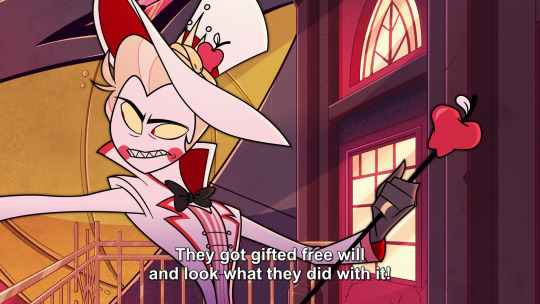
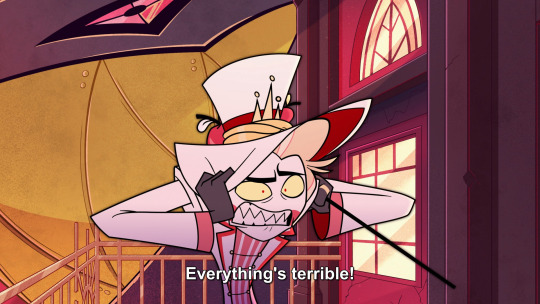
Based on the introduction to Episode 1, Charlie also views 'free will' as a gift (Miltonian), whereas Lucifer appears to view it as a curse.
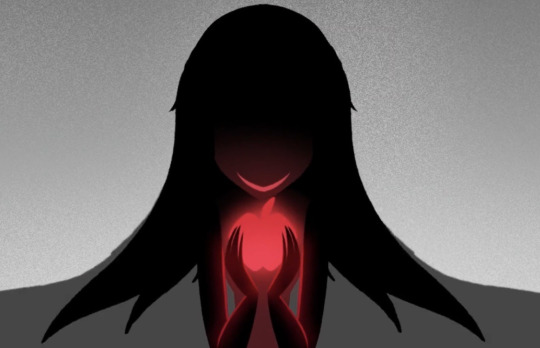
However, Charlie also notes that it was through the 'gift' of free will that the "root of all evil" entered the world, for if mankind could choose to be good, then they could also choose to be evil ('malus').
John Milton states in Paradise Lost: "Of Man's First Disobedience, and the Fruit Of that Forbidden Tree [malus], whose mortal taste Brought Death (evil, malus) into the World, and all our woe."
Thus, the use of an apple specifically is likely a tie-in to what others have been speculating about a character that series creator Vivienne Medrano (Vivziepop) alluded to a while back: "The Root of All Evil".
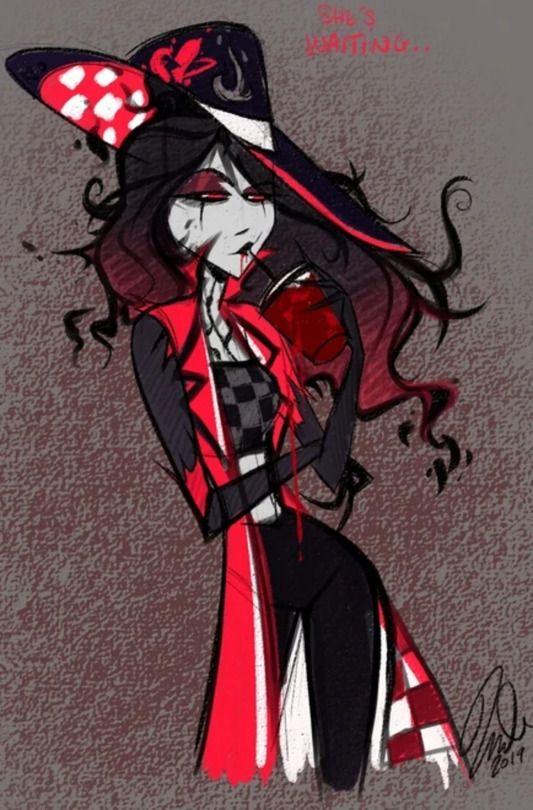
However, "Roo" itself is depicted as possessing the body of a human woman, presumably Eve, the first one to eat the "fruit of knowledge":
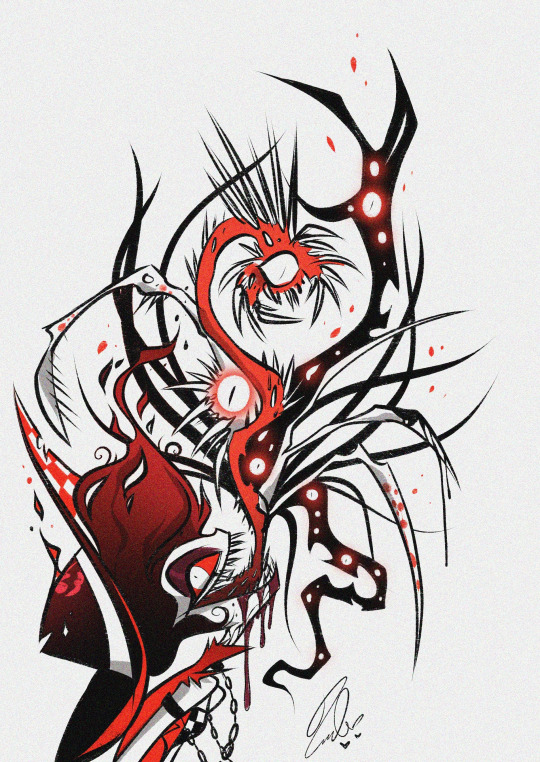
Thus, we can discern that "Malus" likely refers to this character. (Also see: "Maleficent", a name that also uses the root word "mal", "evil".) As for Roo's intentions, if Charlie is "good" - and, if, in fact, Alastor was sent by "Roo" (Eve) - then they may want for Alastor to work on their behalf to "corrupt" Charlie, or make sure the hotel never succeeds.
This is because demonic power is tied to human souls, and there are "millions of souls" in Hell, which likely fuels the great power of "Roo". The more souls there are in Hell, the more powerful "Roo" becomes. The Overlords also get their demonic power from "millions of souls".
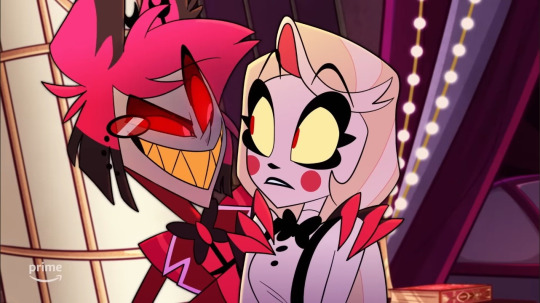
The deal between Eve and "Roo" might even be the first contract, or deal, between a human soul and a demonic entity; in exchange for 'free will', and the knowledge of good and evil, Eve allowed the "Root of All Evil" to inhabit her body, and to escape the void or prison it was confined to by Heaven (Hell?). (For one cannot be 'all-good' unless you attempt to 'eliminate' or 'ablate' evil; and, in Greek mythology, Zeus imprisoned the Titans in Tartarus for all of their evil deeds.)
Another possibility, brought up in an article by Gillian Osborne, is that Lucifer sees the "fruit of knowledge" as an apple, but it may appear as different fruits to different people, depending on how they view it. This also fits with Lucifer and angels being able to easily shapeshift.
In Paradise Lost, only Lucifer describes the fruit as an "apple" (malus), as he associates malus with "bad, evil", while the narrator also describes the fruit as "a mix of different colors" and peach-like. This then begs the question: "Did the fruit of knowledge of good and evil become 'evil' because Eve harbored resentment towards Adam?"
Quote: "Lucifer (Satan) gives Eve yet another hint that this tree may be more complicated than he wishes her to believe: although elsewhere in Milton's poem Eden is heady with its own newness, sprouting spring flowers left and right, the tree of knowledge is already old: its trunk is 'mossie'. Nevertheless, Lucifer claims to wind himself around the tree 'soon'; the quickness of his reported arrival stands in contrast to the timescales required to cover a fruit tree with moss (PL 9.589). Placing Lucifer's winding body between these two timescales—an easeful present and the inhuman scale of natural history—Milton suggests that there is something dangerous in entangling the past with the present. Yet, 'Paradise Lost' also makes deep biblical history feel like present politics for its readers. When Adam and Eve wander out of Eden at the end of the poem, they famously make their way not only into an earthly paradise, but also into the present. Eden's mossy apple tree therefore represents the pitfalls of conflating nature and history, of seeing any action in human history—even Eve's eating of an apple—as natural, if by nature, we mean inevitability. For Milton, history, unlike nature, is directed by humans, progressive, and, like the reading of 'Paradise Lost', hard work. While trees may inevitably collect moss the longer they live, Adam and Eve's labors in the garden, and our labors of reading, require agency and effort. Milton's poem refuses mourning the loss of Eden, [and the perfection of Heaven], in favor of a perpetual, melancholic, recreation of paradise: a present perfecting."
To quote Twisted: The Untold Story of a Royal Vizier, which also draws inspiration from John Milton's Paradise Lost: "It's an unfortunate situation...but you do have a choice [i.e. free will]."
#hazbin hotel#hazbin hotel analysis#hazbin#hazbin analysis#hazbin hotel meta#hazbin meta#hazbin hotel theory#hazbin theory#deep thoughts#john milton#paradise lost#eve hazbin hotel#lucifer hazbin hotel#lucifer morningstar#adam hazbin hotel#lilith hazbin hotel#lilith morningstar#roo hazbin hotel#root of all evil
202 notes
·
View notes
Text
🎤♡
Luck Be a Lady closes out the night for you with cheers and claps and whistles from patrons who think that your performance is something special, uniquely for them, like it's not something you do every night (except Tuesdays) without fail. Same songs, same accompaniments, just different faces in the crowd. All but one. Although, technically John isn't in the crowd amongst his skeezy patrons, he's holed away up in a VIP booth which no one can access apart from him, listening to you sing over a bourbon from a bottle that probably cost more than your rent.
Tonight has been a more tiring one. You can already feel your throat getting tickly and sinuses getting blocked, no doubt a nasty cold coming in. The constantly changing sleep schedule and cold winter banished to he outside of the oddly cosy casino probably don't help matters, either. Upon slipping backstage, you can't help but yearn for a hoodie and some sweats, maybe some fuzzy bedsocks and a pint of ice cream to top it all off, but no luck when the stage manager gives you a quiet "Boss wants to see you."
"John." You acknowledge upon walking into his lavish office, all dark stained wood and buttery leather, plopping yourself down on the chair opposite his own - and regretting it instantly at the way it only increases your desperation to curl up and sleep somewhere warm tenfold.
"Bird." Your boss coos back, already taking the initiative to flick on the kettle for you, make you something comforting.
"Chamomile or green?"
"Chamomile, please." You hum in response, letting your chin rest in the crook of your palm as you weakly attempt to stifle a yawn.
You nurse the sturdy mug between your palms when it's handed to you, revelling in the peace and quiet of Johns office, far from prying eyes and too loud noise, all whilst he pours himself another bourbon and settles in his own high backed office chair.
"You sang beautifully tonight." Johns voice is a low rumble that settles in your bones and warms you from the inside out.
"You sing beautifully every night, but tonight you sounded especially lovely."
"Thank you, sir." The mug of tea is warm in your hands as you curl a little further in on yourself, letting your lashes flutter shut against your cheeks for just a blissful moment.
"John." He corrects with an almost encouraging sternness which has a small smile pulling at the corners of your lips.
"Thank you, John."
"You mentioned changing the setlist last week." The nonchalant observation of your boss has your eyes opening, meeting his eyes so blue that you'd happily drown in them.
"Don't look so nervous, Bird. You're the singer, I trust your judgement.
Tell me more."
"I just think that - we tend to get repeat customers, right? The regulars who come most nights." John gives an encouraging nod, inviting you to continue as he takes a sip of the golden liquor swirling in his crystal glass.
"We do the same setlist almost every night, and I just thought that maybe it'd be a good idea to switch it up from time to time - keep things fresh, keep the customers coming in."
"I'm listening."
"Obviously we keep in some of the classics - the signatures; Luck Be a Lady, Art Deco, Summertime. But maybe we could also do some other stuff too?"
"Like?"
At that you give a little noncommittal shrug, taking a sip of your own drink, inhaling the deliciously fragrant steam. It only lulls you deeper into your tiredness, your longing for a hot bath and the comfort of your bed.
"Fleetwood Mac, Nina Simone, Duran Duran. Stuff that people are familiar with, y'know?"
"You've spoken with the band about this?"
"Mhm."
"Write me up a setlist and I'll sort it."
John gives you an affectionate smile as he withdraws a cigar from the leather case on his desk, a lighter appearing between his fingers not a second later.
"You mind, Bird?"
"S' no bother."
"You take the underground home, that right?"
"Yes, Sir."
"John, Bird."
You huff out a quiet little laugh at his insistence, but give him a slow, understanding nod as you sip away at your tea, letting it soothe the irritation in your throat and warm your bones.
"I'll have a car take you home."
"Sorry?"
Your obvious confusion has a smirk pulling at the corners of Johns mouth, the sides of his eyes crinkling at the sides. His hand finds yours, giving it a gentle squeeze, affectionate.
"You're cold and it's snowing out. I won't have my Songbird getting sick. What kind of a man would that make me, hm?"
"I have a coat - I can always take a cab."
"Or you could just let me look after you."
After a few minutes of contemplation, weighing up the thought of walking the half hour to the tube station in shoes very much not made for this weather, or giving in and letting your very attractive employer get you home safe, you give a little nod, a tired, grateful smile angled his way.
Wordlessly, John leans back in his imposing chair, legs opening slightly, one hand keeping his cigar between his teeth whilst the other pats the top of his thigh in a silent invitation. It's a tactical choice on his part, a gesture which you can easily ignore, or take him up on.
The sound of your shoes tapping across the floor hits you before your actions do, and yet you can't help but sag into the warmth of his lap, curl into the hand he places so carefully on your cheekbone like a contented cat. John replaces his cigar on the pretty glass ashtray in order to pick up his bourbon, raising it to your parted lips, tipping it gently back, letting the honey coloured alcohol warm your tongue.
"My grandma used to say that Whiskey cured colds." He hums, running his fingers through your hair with gentle reverence, happy to see you relax into the comfort he's wanted to provide you with for so long.
"People also used to say that lead made for good foundation." You quip back affectionately, yawning as you lean back into his touch, letting your head rest on his suited shoulder.
"Very funny, Bird."
#cod mwii#cod mw2#captain John price#John price#captain price#price#captain price x f!reader#captain price x y/n#captain price x reader#john price x reader#john price x y/n#john price x f!reader#price x reader#price x y/n#price x f!reader#call of duty#cod#cod modern warfare#tf 141#modern warfare#call of duty modern warfare#john price cod#celestialwhoree#casino!141 au
190 notes
·
View notes
Text
This took 6,000 years to put together.
I need to talk about some things — things that are afoot — before I pop. On my (pick a card, any card, shhh) rewatch, I've picked up on lots of potential Clues and Foreshadowing. Shouts like David Tennant, "I want to be heard!" and waves hands like Detective Azirapalalala.
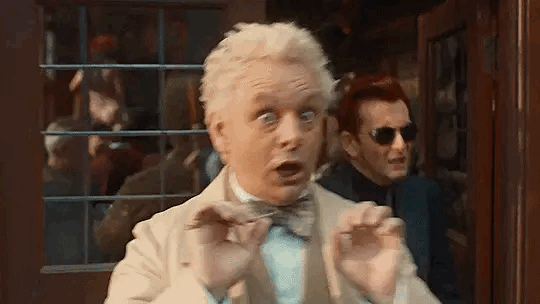
It starts, as it will end, with a garden.
Season 1 indeed began with a Garden. The Garden of Eden. I'm going to leave this here for now, but I'm going to come back to it.
Neil never does anything by accident. Everything we saw in Good Omens season 1 and season 2 had a purpose. Have you got your turtlenecks on? Right. Let's go.
While season 2 had a heartbreaking ending, their story is not over because —
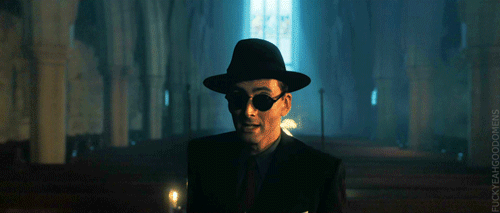
It starts, as it will end, with a garden.
Foreshadowing. There was a lot of it. I'll start with two important lines that were said by Crowley and Maggie. Maggie mirrors Crowley.
"I'm coming back. I won't leave you on your own."
Crowley had to leave Aziraphale in order to save the humans, but then we got, "I'm not leaving him to face them on his own."
Parallels. Similar lines, and, in that moment, Maggie took Crowley's place as Aziraphale's protector.
“Would I lie to you?”
Crowley does lie, but he promised Aziraphale that he’d come back to him, and he did. I’ll come to you is something Crowley will never lie about. More on that specific detail later. WAIT AND SEE!
Season 1, Episode 5: The Doomsday Option
"Look, wherever you are, I'll come to you. Where are you?"
Season 2, Episode 5: The Ball
"I'm coming back. I won't leave you on your own."
There are parallels here too. Both lines are similar, both were spoken by Crowley and both were in the fifth episodes. It might not mean anything, but it could be a Clue, and I've still got my eye on Neil ... and his ominous lighter.
Season 2, Episode 6: Every Day
"Angels are like bees. Fiercely protective of their hive."
This line shouted at me. Anthony "Ji'mNotNice" Crowley, while no longer an angel, has the protective tendencies of a Guardian Angel. He is the bee. Aziraphale is the hive.
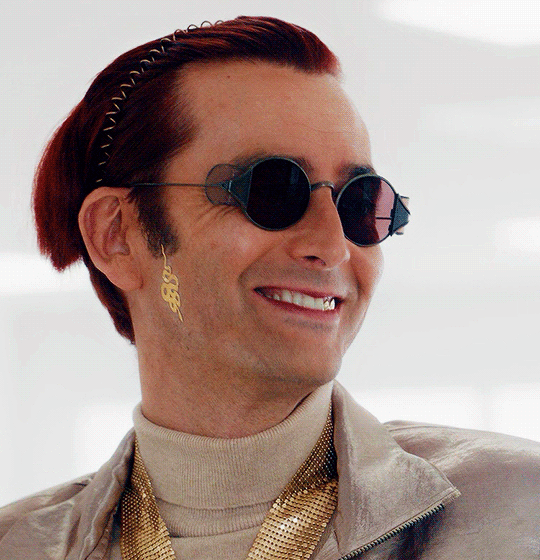
In the fifth episode of season one, Crowley had been stuck in a traffic jam and then decided he was going to go 100% feral and drive his Bentley through fire. Nothing was going to stop him from getting to Aziraphale.
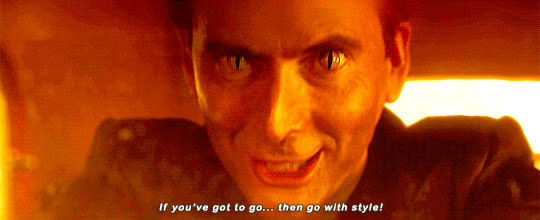
In episode 1 of season 2, The Arrival, Crowley losing his temper, I believe, foreshadows his threat to Jimmm “ShortForJammmes” Gabriel —
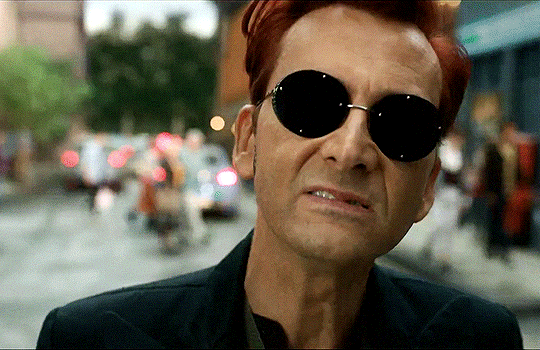
— which took place in the fifth episode of the second season.
“But I was there, and I do remember very clearly the look on your face, Archangel Gabriel, when you told my only friend to shut his stupid mouth and die.”

Right — ready? I threw these in as well because I have a hunch that they could also count as potential foreshadowing. Let's look at three very specific lines.
Season 2, Episode 2: The Clue

I need to talk about that line because it appears to heavily foreshadow the end of season 2 episode 6.
Aziraphale went with the Metatron to Heaven despite his bookshop. His love for food. Coffee. The kiss. Crowley. Despite everything he holds dear.
He is going along with Heaven as far as he can.
I'm going to talk about the Coffee Shop Theory first, which is going to lead right into the Body Swap Theory, and why I don't stand by them.
The Coffee Shop Theory
We don't know a lot about the Metatron because we've hardly seen him as anything other than a floating head and his claim to be the Voice of God — at least right up until the end of season 2.
There were a lot of red flags floating around just like his head. This conversation to start with...
The Metatron: Do people ever ask for death?
Nina: What?
The Metatron: Well, the name of your establishment. Give Me Coffee or Give Me Death. I assume they always ask for coffee.
Nina: They don't ever ask for death, no.
The Metatron: No, I don't suppose they do. So predicatable.
So predictable.
There was a sinister edge to it, and I didn’t like it. Crowley has asked about the name of the coffee shop, too, but it’s Crowley. He’s harmless. Something about the Metatron doesn’t sit right with me.
1) None of the angels in the bookshop seemed to recognize the Metatron, but at least several of them should have. They did see him as a floating head, so why didn’t they know him while Crowley did?

2) Where exactly has God been?
3) There was definitely something evil about that look the Metatron gave to Crowley in the bookshop. Why didn’t he seem to react to it?
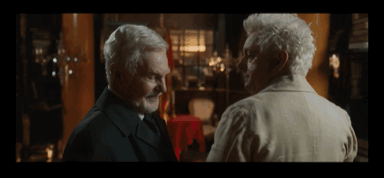
The Metatron appeared to use manipulation tactics and mimicked Aziraphale’s speech patterns as a way of convincing him to accept his proposal. He brought him a coffee — it’s no secret that Aziraphale enjoys coffee and nice meals — complimented him — an angel of your talents — used the phrase jolly good — something Aziraphale has said before — and threw this in.
“As Supreme Archangel, you would get to decide who to work with.”
He’s using Crowley as another manipulative tactic because he knows how deeply Aziraphale cares for him, but —
1) He knows Crowley will not agree to return to Heaven.
2) He wants them separated because they are too powerful together. And nothing will be able to stand in their way if they are not separated.
Performs a wibbly wobbly timey wimey miracle
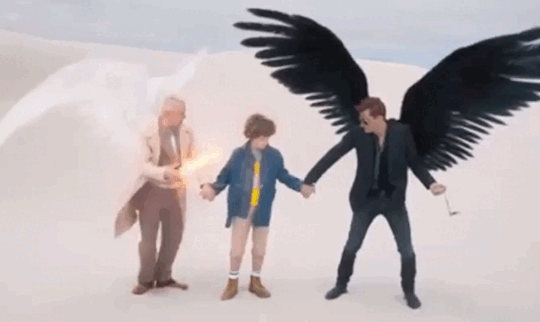
The Body Swap Theory
Aziraphale is a master of his face. He’s bubbly almost all the time, but when he’s not, it shows. I can’t bring myself to stand by the body swap theory because of two things.
Aziraphale made this face when he had Hell convinced that he was Crowley. This smile —

— closely resembles this smile.
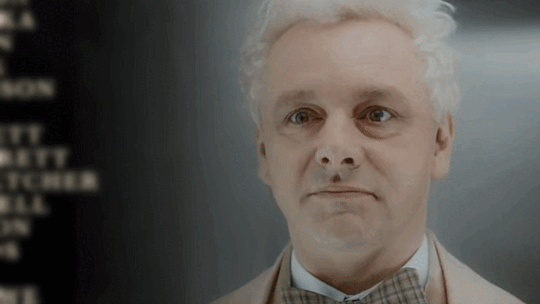
This is Aziraphale, but he’s not the Aziraphale we know. This is an angel who has already put his armor on and is ready for battle. This is an angel who is going to fight for everything he holds dear.
The Metatron may have successfully separated them, but he clearly hasn’t been paying close attention to Crowley or Muriel. He apparently didn’t notice how feral Crowley became when Aziraphale was threatened in any way.
You don’t separate the bee from the hive.
Muriel willingly took our favorite murder hornet bee into Heaven. It’s clear they like Crowley, and he likes them as well. There were no signs that Muriel lost their angelic powers, and that could result in them getting Crowley into Heaven again. I believe they are going to play a key role in season 3.
Performs another wibbly wobbly timey wimey miracle…
“You’re just an angel who goes along with Heaven as far as he can.”
“Oh, I am, but rescuing me makes him so happy.”
“You came back.”
My point is … m’point is …
Aziraphale will always go along with Heaven as far as he can … until he doesn’t, and I believe we will get to see that in season three. As soon as he was told of the Second Coming, it was clear that he was not pleased.
“You’re so clever. How can somebody as clever as you be so stupid?”
Aziraphale is clever, and dangerously so.
And that set Armageddon his plan into motion.
To wrap things up, here’s the thing regarding more on that specific detail later — Crowley will always be the bee, and he will always be fiercely protective of his hive Aziraphale, and he will either always be waiting for him or always come back to him.

It starts, as it will end, with a garden.
Their Nightingale will sing once more.
#good omens#crowley#aziraphale#david tennant#aziracrow#michael sheen#ineffable husbands#aziraphale x crowley#crowley x aziraphale#good omens 1#good omens 2#good omens meta#ineffable idiots#muriel#the metatron#nina#maggie#ineffable fandom
395 notes
·
View notes
Text
Labyrinth
{Fandom: Grishaverse}
{Pairing: Kaz Brekker x fem! reader}
Summary: Y/N has spent many a nights waiting for him to come back safe.
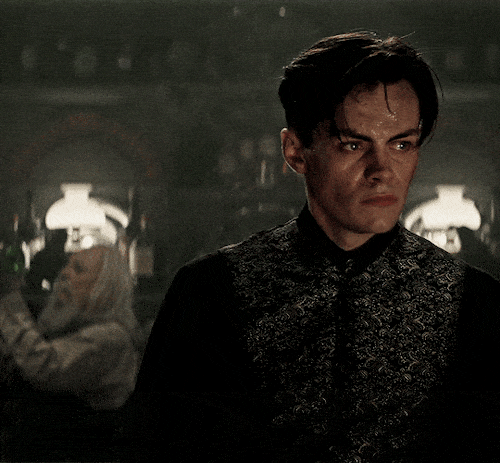
“It only feels this raw right now
Lost in the labyrinth of my mind
Break up, break free, break through, break down
You would break your back to make me break a smile”

Caring about someone sucked.
That was a new realization that Y/N had come to. She had always opened her heart to people, letting them in. Some saw the damage and left and the right ones stayed, settling in her heart as if they were always meant to be there.
She didn't have much, but she had hope.
Until she met the bastard of the Barrel. Caring for him had never been the plan. Slowly falling under his spell as their eyes met across rooms should have never happened.
And yet it did.
Every small quirk of his lips, every time his gaze flickered to her, every word spoken in the quiet of his office, it made her fall deeper and deeper.
Until she was drowning in him.
But he was always too far on the shore to hear her, to see her struggle.
Counting kruge while she counted the stars in his piercing eyes.
The bell struck twelve and Y/N sighed, placing her head in the palm of her hand as she waited for Kaz to return.
In the meantime, she flipped through the paperwork she was supposed to help him with tonight. He was already late, there was no way she would let him do the paperwork now.
Not that he would listen to her. Which is why she decided actions were better than words.
Her anxiety crawled higher up her chest with every bell that passed but she pushed it down, continuing to work. Kaz would be fine. He was always fine. There was nothing in the Barrel that could get to Dirtyhands.
Nothing that would take him from her.
Y/N finished putting away the books, placing it exactly how Kaz liked. She settled back against the chair, pulling her knees to her chest, her foot tapping incessantly.
Any minute now, he would walk through his office doors, chastising her for her odd position on the chair, and everything would be alright in the world.
The bell struck twelve past half, and Y/N bit on the inside of her cheek.
Any minute now.
Y/N's eyes snapped open when the door to the office finally opened, and in walked Kaz. A sigh of relief escaped her lips but her breath stuttered in her chest when she took him in.
His face was covered in blood, gashes and cuts lining the sharp edges of his annoyingly handsome face and his limp was even more pronounced. She could even see blood staining the crow head of his cane.
Kaz paused in his tracks, his bitter coffee-brown eyes looking over at her, "Shouldn't you be asleep?"
"Shouldn't you be not covered in blood?" The snark in Y/N's tone was hard to ignore, just as the concern was, too sharp but too warm. Like a double-edged knife twisting in both their chests.
"I thought you might like it" Kaz raised an eyebrow, a challenge in his intense eyes as they flickered to her, savouring every bit of her while he could, "Aren't you always saying how good a man looks covered in blood in those books of yours?"
Kaz walked to the sink in the corner of his office, not waiting for her answer.
"Saints" Y/N shook her head, watching him, lips pulled into an incredulous frown. She followed after him, leaning against the wall, "I am never telling you anything ever again"
Kaz ignored her words, though his lips quirked up faintly. He looked at her through the mirror as he started peeling off his bloodied jacket, and then the shirt that had once been white, now stained blood red.
Y/N bit her lip harshly but did not say anything. Her eyebrows creased in concern, and she looked away from him, eyes trained on the dekappal on the other side of the room.
"I let Nina heal the worst of the injuries" Kaz's raspy whisper broke the heavy silence that had settled over the room and Y/N's eyes flickered up, watching him wash away the blood with a wet rag.
She swallowed, her eyes tracking every movement, from the glide of his pale fingers to the soft expansion and contraction of his chest.
Y/N's eyes caught sight of the numerous blue and purple forming on his shoulders and chest but there wasn't any open wound in sight. She let out a soft breath, arms crossed over her chest, "Right..okay"
Kaz gripped the sink, shoulders slumping slightly as he continued to wipe the blood away. He opened his mouth as if to say something but closed it after a moment.
He had nothing to say to her. Nothing that would comfort her. Nothing she would want to hear from him anyway.
Y/N waited for him to finish drying himself and putting on a clean shirt before she walked up to him, taking the discarded rag from him, "Let me see"
He turned his face to look at her, the dried blood still coating his face, his jaw clenched, but he let her examine him, his heartbeat picking up as her beautiful eyes traced the length of his face.
He knew what he was, a monster made man; crooked and wrong. But as she looked at him with such care and concern, he felt human, if only for a moment.
Love was a poison slowly filling his system and she was the one feeding it to him, and all he could do was wait for the next dose.
Y/N bit her lip, and her fingers itched with the need to reach up and clean his wounds, be the balm to his ever-bleeding wound.
But she knew that was a line she could not cross. Couldn't even dream of it.
Y/N sighed, and let the rag drop back in his hand, careful not to touch his bare fingers, "clean up your face and then put some ointment on the cuts"
Kaz's eyes flickered to her eyes dropping to her lips and then to the tag in his hands. His dark eyebrows furrowed in a solemn frown, "what, am I not pretty enough for you like this?"
Y/N raised an eyebrow at him, nudging the toe of his shoe with her own, "Your pretty face will get infected if you don't patch it up"
She spared him a long glance, fingers curled tightly into fists to resist the urge to stay, to help him even if he won't let her, she cleared her throat softly, "I am going to bed"
#six of crows x reader#kaz brekker x reader#kaz brekker x y/n#kaz brekker x fem!reader#kaz brekker x you#kaz brekker imagine
141 notes
·
View notes
Text
Worn Blade, Act I ✦ K.B.

✦ Kaz Brekker x Fem! Reader
━━━━━ ( SYNOPSIS. ) She who was known throughout Ketterdam as 'The Blade' disappeared years ago, leaving behind the blood of many victims. Yet, tonight, some claim to have caught the silver glint of a well-known dagger. But this is impossible: no one escapes from Hellgate.

-ˋˏ masterlist ✦ next ˎˊ-

ACT I. « In The City of Hell, All Souls Burn » ━━━━━━━━━ ✦
In the city of vice and crime that was Ketterdam, rumours travelled fast. Words had no role to play in this intricate pattern. Everything was known in silence. It was in this very absence of words that the news emerged: its weight was all the heavier and suffocated those who, with their looks, carried the heavy task of knowing.
One knows but prefers to keep it quiet. Perhaps this would give too much importance to what one thinks is true; perhaps the mere fact of formulating it would make the information real. In silence, it remains a mirage, a blur that needs to be elucidated—or not.
It is in the silence that rumours are born in Ketterdam, and it is also there that they die.
For several hours, the narrow streets of the Barrel, shiny with dirt and rainwater, had been silent, but the eyes were full of life and fear—the mirrors of the soul never sparkle as much as when fear tints them with black and tears. You never feel more alive than when you are terrified. You cling to what moves you in the hope that it will protect you.
The whole neighbourhood came alive alongside this poisonous breath of life.
Silence had even infiltrated the establishments. The card games, alcoholic drinks and sounds of kruge being dropped on the tables were abandoned when the rumour circulated from glance to glance, from frown to frown, without ever being pronounced—not even when all the lips mutely formed those two cursed syllables.
A name on every mouth, on every tongue. A name that had been hanging in a protective silence for several hours, which Jesper Fahey broke into a thousand pieces when he returned to the Crow Club after his shift.
"Rumour has it that The Blade is back in Ketterdam.”
He must have spoken loudly for all the customers turned as one towards him, towards the one who had just broken the sacred mutism, and with it, made this rumour real. It was as if, by pronouncing the forbidden name, he was invoking it here. Some hiccupped. Others left without a word, abandoning behind the promise of money, so weak in the face of the horror and fear this particular name provoked in them.
Ignoring the chaos he had just shamelessly wreaked, the sharpshooter joined the table, hidden in the shadows of the most isolated corner. He dropped into the chair next to Wylan, whose frightened look would have been laughable if it didn't reflect that of Inej. There were only two Crows around the table. The others must have been busy with other things: Matthias and Nina, snogging; Kaz, counting his kruge.
“Impossible,” Inej finally protested after she had recovered from the initial shock of the news. “She was sent to Hellgate years ago.”
“Well it looks like she found a way out," Jesper shrugged as he said this, far too busy pouring himself a glass of whiskey to worry about the Suli girl's reactions. “Besides, does it really seem far-fetched to you? It's The Blade, after all.”
“Stop saying her name!” Wylan pleaded, while Inej prayed to the Saints quietly.
For a while, none of the three said a word.
“They say that some people have seen the reflection of her dagger in the harbour,” Jesper finally said, this time in a whisper. Even if he was not as superstitious as the other two, it would be wrong to say that the prospect of one of the greatest criminals once again roaming around Ketterdam did not send shivers down his spine.
The Blade had been a legend in Ketterdam, like all those who were privileged enough to have an alias. Few people had dealt with her directly. Those who had faced her dagger and sword were no longer around to tell the tale. She acted in the shadows and was only ever betrayed by the silver glint of her blade. All, however, knew her name and her actions. Protean and ubiquitous—both a reaper and a saviour, a criminal and a vigilante—she was an intangible omnipresence that not even the Wraith could capture.
Everywhere in Ketterdam you could still feel her presence, even after she had been sent to Hellgate. She had scented the cobblestones with the metallic smell of blood for so many years that some of them were still stained with crimson: a sordid reminder of the horror that this city could harbour.
“I don't know if it's true, but why wouldn't it be?” Jesper continued. “It's been years since we've heard anything about her, and suddenly she's back. If people wanted to play a bad joke, they would have done it long before.”
The silence did not deceive, nor did the looks. The sharpshooter had seen them. A simple rumour would have faded quickly as it passed from ear to ear and would have taken as many forms as misunderstandings allowed. Here, people stubbornly cloaked it in the secrecy that the absence of words guaranteed. More than anything, its content did not change. The person concerned was still The Blade. The place was still the harbour. The subject, still that damned silver reflection.
“If that's true, we'll have to be ready,” Inej said, to which Jesper nodded. What this return implied seemed to suddenly dawn on them and on their shoulders. Their postures stooped under the weight of a certain, gloomy future. The tension in the room could have been cut off, so tangible was it.
Wylan asked what she meant by that. Although he knew who The Blade was, he, like many others, did not know what had really happened that night, years before.
The Zemini poured himself another whiskey, a grimace contorting his face. Inej took it upon herself to answer the chemist.
“Don't you know? It was Kaz who turned her in to the Stadwatch."
“And if I were her,” Jesper continued. “The first thing I'd do after I ran away from Hellgate is get revenge on the guy who sent me there.”
━━━━━━━━━━ ✦
Years before, far from the current violence of the Barrel, in a city still tinged with vice, an event occurred that all who lived through it still remembered.
It was an evening lulled by the usual Ketterdam melody, the dissonant harmony of a blood-stained score. The fat laughter of drunken patrons, whose pockets full of kruge were just waiting to be emptied in the gambling games, echoed and shook the ribcages. In the dark alleys and filthy dead ends, nameless criminals indulged in their favourite pastime: violence, the cracking of whose bones acted like the percussion of a piece that the occasional gunshot would complete.
One false note, however, tarnished this melodious ensemble. The city was more agitated than usual. The Barrel district, too, had become infected by the strange atmosphere. The curious eyes of the inhabitants perched behind their windows were riveted on the main street, or rather on the bridge at the junction between West and East Stave, where numerous Stadwatch had positioned themselves and were waiting, weighted batons in hand. Passers-by, even with alcohol clouding their senses, frowned at the sight of them: motionless, defensive, ready to pounce on their prey. Others roamed the streets, blind to the usual heckling.
They had colonised Ketterdam and every corner of it.
Many were surprised at the look of determination on their faces. Stadwatch were normally simple-minded soldiers, easily led astray if promised the right amount of kruge. No one had ever seen them walk with such confidence. It was as if, before the astonished eyes of the crowd, they had metamorphosed into an invincible army.
They moved like men on a mission. No one, however, knew what this very mission entailed. Everyone, that is, except one person, whose irregular footsteps indicated his presence to the other souls on the street, curious to know what was going on. The crowd split in two, leaving a clear path for the one they called Dirtyhands.
At the same time, three Stadwatch emerged from an alleyway dragging a figure whose damp hair—no one was quite sure if it was blood or sweat—stained a face that Kaz Brekker, much younger then, knew to be distorted with rage.
There were murmurs. Some wondered who it was, others seemed to know but could not bring themselves to believe it. The silver dagger in the hand of the guard on the left, still soaked in blood, spoke for itself, however. There was no doubt about who this new prisoner was.
The Blade had been captured.
In Ketterdam, there were no 'Wanted' posters, for no one would read them, glued on the sticky walls of bars. The city was teeming with people with vices, which would only worsen from one soul to another, all of whom more or less deserved to rot in a cell. One would not see the bricks anymore if everyone who deserved to be arrested were to have a poster bearing their effigy.
Every criminal was wanted, but the most dangerous of them had a bounty on their head—a way for the Stadwatch to delegate their work to someone braver than them.
No one usually held it against them, though. Who would try to capture a Dirtyhands or a Blade? No one was foolish enough to even entertain the thought. In the Barrel, that ocean of unlaws and sins, the strongest ruled and remained untouchable, thus taking the shape of holy sinners.
At least until today.
“Move.”
The figure, who was much less impressive without her reputed weapon, was hit twice in the stomach. In pain, she bent over and didn't have time to get up before she was violently pushed by one of the soldiers. Never before had the Blade offered such a pathetic sight to see, there, slumped on the ground, her face in the mud. The one who was thought to be untouchable was no longer so. Kaz gloated, happy to see a rival without a dagger, the only silver touch on her being the rusty handcuffs.
Fierce eyes met his, as if over the din she had managed to hear his thoughts. It had only taken her a second to find him, in that shapeless crowd of black figures.
“You'll pay for this, Brekker.”
She knew.
The Stadwatch pushed her again.
“Shut up and move. You won't be so smart in Hellgate.”
There were hiccups. The whispering started again. Some even protested: no one, not even criminals, deserved to end up there.
Hellgate. Hell on Kerch. Hell on Earth.
Impassive to his sentence, the woman did not take her eyes off Kaz's, who intentionally let a slight smirk decorate his face. This had the desired reaction. She seemed to become enraged, enough to try to escape the guards' grip. One of them was sent to the ground and she crushed his hand, the dreadful cracking of which, even more than his cry of pain, triggered many shivers of fear in the spectators.
She managed to take several steps towards him, splitting the crowd in two, but was soon caught. The punch in her face destroyed any hope to escape. Spitting blood in the direction of her rival—a last satisfaction—, the woman finally let herself be dragged out of the barrel, towards the harbour, where a boat was awaiting to take her to Terrenjel.
“You are a dead man, Kaz Brekker! Do you hear me?! Dead!”
These were the last words of the Blade before she disappeared for years, rotting in a cell in the Old Prison tower and only coming out of it for Pekka Rollins’ weekly fights.
That night, five million kruge were placed on Kaz Brekker’s desk.
━━━━━━━━━━ ✦
“But why did he do that?” Wylan asked after Inej had told what had happened that famous evening. "Five million kruge is nothing to him, even back then.”
“We don't know,” Jesper shrugged. He sipped on his third drink. “He never wanted to tell us anything. This came as a surprise because, even though they were rivals, they tolerated each other.”
“Really?”
“Yes. They even worked together several times. She was useful to him. He was useful to her. For him to turn her in to the Stadwatch and reveal her identity… There was more than just kruge at stake.”
To this day, the questions bubbled up in their minds but stopped at the tip of their lips, never getting past that fleshy barrier for fear of reprisals. The few times Jesper or Inej had tried to broach the subject, Kaz had cut the conversation short, chasing them out of his office or leaving the room himself, always muttering insults.
The questions were doomed to go unanswered; the reason, killed and sealed forever in a small corner of the businessman's head—the place where hope for the truth died out.
“So, get some bombs ready," Jesper finished. “Because we're in deep shit too.”
“I—"
The cane that came crashing down on the table startled the three and sent a tidal wave through Jesper's whiskey glass. The crow’s head, momentarily blinded by a leather glove, flickered for a second under the chandelier, reminding the sharpshooter of the silver glow everyone was talking about in town.
Oh, how ironic life could be.
“Can any of you tell me why I can't hear kruge being spent? Why are the tables empty?”
“Hey boss! What do you mean emp-? Oh yes, indeed. That's funny,” Jesper laughed nervously, glancing around.
The Crow Club was never empty. Whether it was windy or rainy, the patrons would always crowd the entrance and drown in alcohol and gambling. The call of greed was a siren song that even the most cunning sailors could not resist.
“Don't play with me, Jesper. Explanations, now,” he snapped.
Wylan ran his index finger over one of the flaws in the table while Inej seemed to find the painting on the wall—one of their many finds from a heist—fascinating. If they saw the Zemini's look of distress and reproach, they did not show it, finding in these trivial details a refuge that would keep them away from the growing fury of their boss.
Traitors, Jesper thought.
He looked back at Kaz, whose furrowed brow made him gulped. If there was one thing that particularly annoyed their boss, it was seeing his business disrupted. Like any good businessman, Brekker became an excellent mathematician when there was money involved, especially losses. It was almost as if he and the kruge were one, as if he could sense their presence—or absence, in this case—whenever he walked into a room.
Every lost kruge was bad news, but an empty Crow Club? An absolute disaster.
What would be the truth, the very truth that had drained the room and with it, their pockets? A cataclysm, no doubt. Powerful, destructive: one of those natural disasters from which one never recovers.
Unwillingly, Jesper had become an oracle à la Delphi—the bearer of an evil omen. The words he spoke would only bring chaos and divine wrath.
"The Blade is back."
Kaz Brekker wavered.
Wherever he went, this name continued to haunt him and was added to many other, much more painful, ghosts. In the midst of a pile of frozen, inert bodies, that of a living person would stand like a threatening tower, its blood-stained shadow hovering over his closed eyelids. The personification of Treason infiltrated his nightmares and, in its ubiquity, continued to plague his life, even when she was locked up in a cell all the way in Hellgate.
It was at night that this bloody spirit tormented him the most, although the daytime was not enough to chase it away completely either. It was that look—which had been full of rage that night—which pierced and tore at the fabric of his dreams.
Powerless, the Crows could only listen to this late-night spectacle, their ears pressed to the wall, as their boss insulted the Saints for sending him the Blade as punishment for his sins.
“Impossible,” he finally spat. “No one runs away from Hellgate.” His emphatic tone did not dispel the doubts of his Crows.
“What about Mattias?" Wylan interrupted, putting aside his wood-esque observations.
“The Blade acts alone. Without help, no one can get out of there. Impossible,” he mumbled again under his breath.
The word suddenly seemed meaningless, as if it had turned into a mere alignment of letters, placed end to end in an artificial order, whose syllables sounded stranger and stranger as they were pronounced. Kaz seemed to realise this because he abruptly stopped speaking, his lips pursed, holding back the 'po' that had wanted to escape.
Nothing was impossible. Especially not the escape of one of Ketterdam's greatest criminals. A criminal whose thirst for revenge had undoubtedly become the driving life-force behind her actions.
When you have neither money nor love, only rage can save the lonely soul in its relentless search for a goal.
The face of Pekka Rollins suddenly appeared to him, like a mirror held up to his own equally bloody motivations. He saw himself, able to cross all tides to see the one who had deceived him and Jordie suffer.
Only a small sea separated him from the Blade.
Kaz swallowed back a curse.
“Help! Please, help! Somebody! Hurry!”
Screams rose in the street, penetrated the walls, and made the four hearts in the room miss a beat—fearful harmony. The Crows stood up quickly, now alert.
A woman stormed into the club. Blood dripped from the end of her dress, staining the floor with a repetitive and macabre plop. Kaz stared bleakly at the growing red ink stain that made the floor a painting of death. Her hands were bloody too, and the two crimson furrows on her cheeks were evidence of a futile attempt to wash away the cardiac rain that had fallen on them.
In her terrible redness, she had become an allegory of Ketterdam's cruelty.
“They killed my husband!” she cried.
Kaz recognised her. Behind the tears and blood was the face of the wife of one of his Kregs: one of the club's bouncers, often positioned at the entrance to prevent any outbursts. That evening, however, he was not on duty.
“He was stabbed... I– It all happened so fast! I–I don’t–”
She was in shock. Her eyes were bulging; her voice, trembling. Wylan sat her down and handed her a glass of water, which she did not even touch, far too busy telling what had just happened.
A masked figure had appeared in front of the couple as they passed the Crow Club to meet friends in another bar. The woman had had no time to react before her husband was on the ground, a gaping hole in his chest, his white shirt soaked with blood. She only had time to catch a glimpse of a silvery glint before the figure disappeared into the shadows, leaving behind destruction and death.
“It can’t be...” Jesper didn't finish his sentence, feeling Kaz's black look on him.
“Inej, Jesper, go see what's going on. Wylan, go get Nina and Mattias and some ammunition.”
Protests erupted but he silenced them with a wave of his hand.
“Do as I say. Now.”
Kaz tightened his grip on the crow’s head, as if to reassure himself, to remind himself of his authority, which the mere presence of—if the rumours turned out to be true—called into question. Fragile as a sandcastle, the illusion of power seemed to crumble before his eyes.
The pain in his leg suddenly seemed to intensify.
As the rest of the gang looked on in astoundment, he hurried up the stairs, his face inscrutable.
The door to his office slammed and a vase was thrown.
“We're so going to die,” Jesper sighed, his hand on his guns.

✦ TAGLIST.
@losteroops @avianawrites @outlawqueen17 @lonelywitchv2
#kaz brekker#kaz brekker x reader#six of crows#six of crows x reader#kaz brekker x you#kaz brekker x oc#six of crows x you#shadow and bone#shadow and bone x reader#kaz brekker fic#✦ worn blade
517 notes
·
View notes
Note
Any hcs for female Creepypastas?? 🫶
the girlies 💞💞💞
------------------------------------------------------------
A/N: i chose just a few off the top of my head, if you want specific characters don't be afraid to ask <3
characters: nina, sally, natalie, zero, nurse ann
CW: some of these are so angsty for no reason lmao sorry guys
------------------------------------------------------------
-nina 1000000000% bisexual you literally cannot change my mind at all. girls are too pretty to ignore and jeff. exists.
-i like to think that nina has slightly gotten over jeff, but not completely. its like that one ex that you just can't get out of your mind no matter how long ago it was. she's still obsessed with him but doesn't make it her whole personality (she is in fact a human being with her own thoughts and feelings).
-sally is afraid of men. people love to show her being friends with E. jack or toby or ben, but i guarantee she's still petrified of any and all males in her life.
-not to feed into the fanon family idea but all the girls of the manor 100% understand sally and let her linger in their rooms when she's upset or frightened. most of them haven't been treated right either.
-natalie is like that one cool older coworker thats incredibly intimidating but incredibly cool at the same time. you wanna be friends so bad and she's like a fucking rabid dog.
-but nat can braid hair like a fucking PRO. she'd NEVER admit it but she would kill for a classic girly sleepover where they all do each others hair and nails.
-every single crp girl is sickly jealous of 'normal' teen girls. they want the relationships. the high school experience. the makeup. the gossip. the boys. the girls. their first car, their first job, research colleges. go to football games, get fast food late at night with friends. first dates to the movies, sleepovers with friends, all nighters binging netflix, shopping at the mall. all of it. every single crp girl dreams of it all.
-kate is selectively mute. in the time that she's been a crp she's only spoken a handful of times. she's just in a constant state of stress and fear basically.
-zero is SO ANNOYING and SO LOUD. she's like ben on steroids. she needs to make her presence known and you WILL acknowledge her (this comes from a deep down fear of her being forgotten and left behind but we don't have time for all of that).
-nat practically lives on a steady diet of beef jerky, red bull, and doritos. she has the cravings of a teen boy and it's petrifying.
-nurse ann is a WOMAN LOVER. have you SEEN those boobs and thighs. those are FOR WOMEN!!!!!!!!!!!!!!! duh!!!!
-kate does and will bite. toby has the battle scars to prove it.
-sally is such a brat and everyone fucking loves it lmao. she guilt trips and throws tantrums and she'll swear every other sentence just because it's all things she's picked up around the manor.
-nurse ann's voice is like melted caramel and velvet. that shit is smooth and silky and she literally could seduce anyone without even trying (me).
------------------------------------------------------------
god i love women
#creepypasta#creepypasta girls#clockwork#nina the killer#nurse ann#lulu creepypasta#sally williams#judge angels#zero creepypasta#jane the killer#creepypasta fandom#creepypasta headcanon#creepypasta x reader#wlw#wlw creepypasta#ticci toby#toby rogers#jeff the killer#eyeless jack#slenderman#ben drowned#creepypasta fanfic#clockwork creepypasta
195 notes
·
View notes
Text
Okay MCD posting on main but how poetic is it that Aph, a woman who was found in a forest decided to take in Levin, a baby who was left on her doorstep.
Both of them left alone in a dangerous world, found by kind loving people who will care for them and be family.
And to Aph isn't it a way of thanking the world. The world that's given her a home and friends. By taking in a child isn't she saying, I'll make sure that you have a good life, like the one I have.
95 notes
·
View notes
Text
New series idea: analysing my favourite (underrated) lines from Six of Crows
I feel like I haven't given you any analysis in a while, and I've had this idea for some time now so I thought it was worth giving it a try. This is going to be a list of my personal favourite quotes in Chapter 2 of Six of Crows with explanation/analysis for any that I have an explanation/analysis for - but if a famous or popular quote isn't included then it's not because I don't like it, it's just because I don't feel I have anything new to add to the existing analyses around it. And yeah, if you guys like this then I'll make it a more regular thing and go through chapter by chapter (probably sometimes including multiple chapters in one post), so let me know what you think!
(Also, I chose to start with Chapter 2 on purpose because I don't have loads to say about Chapter 1, but if anyone is interested I'm open to trying it in the future)
"every favour came with enough strings attached to stage a puppet show" - ugh words cannot explain my love of this quote. Not only is this a gorgeous and vibrant metaphor that brings forth very clear imagery, it also achieves two different concepts relating to the idea of the "puppet show". Firstly, we have the idea that Kaz is the puppet master and Ketterdam is his stage; he is in complete control, he can bend the city to his whims, and it's ultimate his say that can make or break someone. This is definitely the image we're given of Kaz in the opening two chapters, and this singular line really reinforces that, however the rest of the book and many of the descriptions in Crooked Kingdom unravel this view very quickly. This description far better fits Pekka Rollins, which brings me onto the other concept relating to the "puppet show": the question of who it actually is pulling the strings. Arguably Kaz is a puppet on Rollins' stage, and Rollins a puppet on the Merchant Councils'. each has power but each is ultimately at the whims of the other. This brings worth the suggestion that something darker is at play and that there's far more to Kaz than initally meets the eyes before we've even met him, so in short it's just completely and utter genius.
"Kaz hated a puzzle he couldn't solve, and he and Inej had concocted a hundred theories to account for the murder - none of which satisfied" - again, Kaz has thus far said a single line, and not one with a lot of information in it ("Yes and no. It's always good to have a country in debt to you, makes for friendlier negotiations) and yet we know so much about him - and even some details about his relationship with Inej! It even tells us a lot about Inej; we've been presented with a figure heralded as near-omnipotent in his city, someone no-one wants to be on the wrong side of, someone who has complete control over every conversation he has with you, and she is someone with whom he will spend hours trying to solve a riddle? So then, the reader is forced to think, what kind of power does she has? What makes her worthy of his closeness, why does he trust her, and why does she know him well enough to so intimately know his likes and dislikes? Inej hasn't even spoken yet.
"But it didn't feel neutral to Inej. It felt like the hush of the woods before the snare yanks tight and the rabbit starts to scream" - ok most of my enjoyment of this quote is just of the beautiful prose, however I would like to add that all six Crows experienced this sort of 'calm before the storm' leading up to the most painful experiences of their lives - Wylan thinking he could go to music school, Inej at the beach with her parents and calling sleepily to the man she though was her father, Kaz staying at the cafe and meeting Margit and Saskia, Matthias knowing he was going to be a big brother, Jesper seeing his mother for the last time when she picked him up and hugged him even though he was up past his bedtime, Nina feeling that she had purpose and loving the way she could help her country - so this could be considered foreshadowing.
" 'Care to place a wager?' Jesper asked.
'I'm not going to bet on my own death,'
Kaz flipped his hat onto his head and ran his gloved fingers along the brim in a quick saulte. 'Why not Bolliger? We do it every day,' "
"Kaz had done his best to teach her, but she didn't quite have his way with breaking and entering, and it took her a few tries to finesse the lock" - my main source for liking this quote comes from an analysis I did a while ago when someone asked me about comapring this quote and Kaz's self-proclaimed "shoddy job" of teaching her to pick locks. It's a while since I posted that so I'll run through it here briefly, basically it's very indicative of their relationship dynamic. Whilst both place the other on a pedestal, they do it in different ways, and Kaz particularly often glorifies Inej and almost finds it difficult to accept that she, like anyone, must be flawed. So if she fails at something, like picking locks as well as he can, and she cannot possibly be flawed then the error must be in his teaching - it can never be with her. It's also a glaring example of Kaz's self-destructive nature. My other reason for liking this quotes is just that it once again tells us about the characters so early on and without having to directly explain it to us - we know Kaz is good with locks because he tried to teach Inej and she isn't as good as him, but she still manages to get it open.
' "I'm a business man,' he'd told her, 'No more, no less,'
'You're a thief, Kaz,'
'Isn't that what I just said?' " - I ADORE this, but honestly all I can say for analysis is that it sums up the entire theme of the novels beuatifully.
"Now he looked like some kind of priest come to preach to a group of circus performers" - this sets up a great parallel that I've mentioned before in one of my "little details you might have missed/forgotten" posts, but it's also interesting to have it come from Inej's perspective since she's incredibly religious and performed as a travelling acrobat with her family. It's probably drawn from personal experience, someone in dark clothes who judges the brightness of Suli traditional clothing and/or culture and tries to preach religion to a group who've already long found it because they don't align with thier idea of religion. It's even possible that she links that idea with Kaz, not because of his actions but because he's from a country that has perversely sexualised and condemned her culture and he dresses like the rich merchants who would preach this exact kind of message - and possibly even have visited her at the Menagerie, where she was forced to appropriate her own heritage and way of life for the enjoyment of those who look down it with no reason for doing so.
"Inej pitied the boy who might die alone with no one to comfort him in his last hours or who might live and spend his life as an exile. But the night's work wasn't over yet, and the Wraith didn't have time for traitors" - this is one of the few but fabulous examples we get of the idea that "Inej" and "the Wraith" are separate entities; Inej being the girl she was, the girl she should have been, and the Wraith being a creation of necessity to aid survival. Inej is a religious young woman from Ravka who has been through far more than she should have done, but the Wraith was born and raised on the blood-soaked streets of Ketterdam and has every intention of surviving them - no matter the cost. This concept is only mentioned a few times, however it runs a beautiful parallel with the distinction between Kaz Rietveld and Kaz Brekker, or Kaz and Dirtyhands depending on how you look at it.
Ok I realise this is a pretty long post but thanks for reading it if you got this far, and I really enjoyed making this so please let me know if you guys would enjoy seeing more. And, in summary, Leigh Bardugo is a genius
#grishaverse#leigh bardugo#six of crows#crooked kingdom#inej ghafa#nina zenik#kaz brekker#jesper fahey#wylan van eck#kanej#wesper#helnik#soc meta#six of crows analysis#six of crows meta#soc analyst
198 notes
·
View notes
Text
pìwopx

pìwopx [pɪ.ˈwop’] n. cloud
Anonymous Request: Can I request a Neteyam x fem reader where Neteyam and Reader are promised to be mated but they know nothing about each other. All she knows is he’s the chief's son, and all Neteyam knows is she’s the daughter of Ninat, has the voice of an angel, and she’s a pretty good healer. When they finally spend time together, they realize it was the perfect match.
2,093 words
Since I was barely 13, I have known that when I turned 18, I would be mated to the chief's else son, Neteyam.
It wasn't that I didn't have a choice, but it was strongly encouraged that I choose Neteyam, and he was strongly encouraged to choose me, as well.
This made us both shy. Though we had plenty of opportunity to speak and socialize, we avoided each other like the other was a hungry thanator. I would blush if we ever came close to each other, and he would avoid my gaze, and I wondered if he would possibly be able to choose such a nervous, meek girl.
As we grew older, I knew we had to do something to change this. If we were expected to mate for life, we need to at least talk... but it had been years of shyness, nervousness, and anxiety - I wasn't sure how to fix it now.
--
Neteyam watched Y/N, daughter of Nina, as she sat near to the fire. Her face, more beautiful each day, glowed in the light of the dancing flames. He was just close enough to hear her as she sang - people were always asking her to sing - and he closed his eyes for a moment to listen.
As her mother before her, Y/N had a beautiful voice. It was like the wind, like the flap of his ikran's wings as they soared straight up to the blue sky... it was hard to capture with words, how he felt when she sang.
He just needed to talk to her. His 18th birthday had come and gone, and he had to present his intentions to her soon.
He didn't want that to be the first thing he ever said to her.
--
I left my friends late at night, making my way slowly through home tree, ascending through the branches to my hammock.
"Y/N," a soft voice called as I reached for a vine above me. I turned, and behind me was Neteyam. He hopped up, standing on the same long, thick branch I stood on.
"Neteyam," I said, my heart racing. This was the most we'd spoken to each other... ever. And it was just two words.
We stared at each other for a long moment, and I used the awkward pause to admire how handsome Neteyam had become. He was strong, and tall, broad-shouldered like his father, and yet still delicate, like his mother.
He was our clan's fiercest hunter, and I knew I was lucky to have the chance to claim him... I just wanted to know him first, a little.
"I heard you singing tonight. It was beautiful."
A blush crept across my cheeks, deep and hot. "Thank you, Neteyam. I'm grateful to share my mother's gift, though I'm sure I don't compare to her."
"You're better," he said, his eyes wide, his voice earnest, and my blush deepened.
Another long, awkward pause. I tried to come up with a compliment in return, but my mouth was dry, my heart racing.
"I was hoping tomorrow, you would join my siblings and I. There is this meadow... we go to pick flowers for Kiri."
"Of course," I replied, a smile spreading across my face.
"Meet me... here. First light. Bring your sister, Reknel."
I nodded. He reached out, his hand just grazing my arm, before he snatched it back.
I could barely fall asleep that night, I was so excited.
--
Reknel, barely 8 years old, waited impatiently with me the next morning. I had packed something for her to eat, and knew she would be plenty entertained by Neteyam's sisters, even though she was a little younger.
The sun rose, and Neteyam arrived, just when he said he would.
"Good morning!" Rek greeted excitedly.
"Good morning! Are you both ready?" He had a pack slung over his shoulders, as did I. All I could do was nod, and we took off.
All three of Neteyam's siblings were waiting at the edge of the forest. In our effort to avoid each other out of pre-teen shyness, Neteyam and I had also avoided each other's siblings, so Neteyam had to introduce us.
Tuk, barely 13, took Rek's hand immediately, and I was grateful.
"You're going to love it," Tuk told her as we began walking. "It's a beautiful, giant meadow, full of flowers. Kiri picks some of them and we use them to make paints, and medicine."
Rek glanced up at me as we walked, and reached out for my hand, so the three of us formed a chain. She was not typically shy, but could probably sense how nervous I was, and it made her tense; she had always been a sensitive girl.
Eventually, she became enamored with Tuk and Kiri, and ran to walk with them, leaving me behind after I made her take some dried fruit with her to eat.
"I knew Tuk would be excited to have Reknel along," Neteyam said, surprising me by coming up alongside me. He had been trailing behind with Lo'ak.
"Rek loves someone to listen to her talk," I said teasingly. "Tuk is being a good sport."
Neteyam laughed, and the sound warmed my heart.
"You said Kiri uses these flowers for medicine. Do you think... I might take some home, as well?"
Kiri was being trained by the Tsahik herself, but I had been studying, too. As the hopeful mate to the next Olo'eykten, I needed to be a talented healer. I had to admit, I preferred hunting, fishing and singing but, healing was a worthwhile task.
"Of course. Kiri was hoping to show you what she's found here, and learn from you."
I couldn't stop myself from rolling my eyes. "What could she learn from me that she hasn't learned from your grandmother?"
"Grandmother has seen your work - she thinks you will make a fine Tsahik."
There it was. We had mentioned it. I could be the next Tsahik, if Neteyam chose me, and I accepted.
My mouth felt dry again, my head a little heavy, my palms sweaty. I blinked, hard, trying to force myself to focus - this was silly! We were both adults now, and how were we ever going to figure out if we would be a good pair, if we couldn't talk about it?
"We've wasted a lot of time, haven't we?" I asked, trying to smile.
"How do you mean?" Neteyam asked. I looked around - Tuk, Kiri and Rek were far ahead of us. Lo'ak behind, but out of ear shot. This was our chance to really talk.
"Well, we could have been friends, or at least gotten to know each other. Now it feels sort of, strange, doesn't it? You're supposed to come to me and ask me to be your mate, and I'm supposed to say yes, and all I know about you is that you're very handsome and a great hunter."
Neteyam shrugged, but nodded. "All I know about you is that you're very beautiful, and a great singer - a good healer, too."
"What else do you want to know about me?"
He looked away from me, staring ahead at our siblings, furrowing his brow as he considered the question. "Tell me about claiming your ikran."
And we continued, back and forth, sharing stories of our families, our experiences, our likes and dislikes.
Neteyam loved swimming, and I told him I wanted at least three children. I told him the happiest day of my life had been when Rek was born, and he joked that the happiest days of his life were before Lo'ak came along.
We laughed, very hard, sharing stories of our first hunts and my failed attempts at weaving. Neteyam wasn't just handsome and a good hunter - he was a good listener, and funny, too. Plus, up close, his smile was more beautiful than anything I'd ever seen.
By the time we reached the meadow, I felt as if I was walking on a cloud.
--
Her voice was just as beautiful when she spoke as when she sang. When she laughed, it was like a harmony, and all Neteyam ever wanted to do was make him laugh, for the rest of his life.
When they reached the meadow, Kiri pulled Y/N away, showing her the flowers, and he watched quietly as Tuk and Rek helped them carefully pick and pack them in small sacks, while Kiri and Y/N explained what each flower was useful for.
She was so smart, too. She wouldn't admit it, but she was a promising healer, his grandmother had told him so, going so far as to say that the clan would be safe in her hands as Tsahik.
"So, how's it going?" Lo'ak came up behind him, elbowing him in the side. "I heard her laughing. Both of you, really. Her laugh is better than yours though. You sound like a wounded angtsìk."
Neteyam rolled his eyes, but smiled. "I think it's going... well. She's different than I thought she would be. She's really smart, and very funny, and-"
"Too good for you," Lo'ak cut him off, and the brothers laughed together.
"Too good for me."
--
We spent hours in the meadow. After we'd picked all the flowers we wanted, we ate lunch together, all sitting in a large circle, talking and laughing.
Neteyam and his siblings were so joyful, and despite the teasing and almost fighting, they were very close - it was really fun to be around. Reknel was having the time of her life; it would e hard to peel here away from Tuk at the end of the day.
Eventually, the sun began to grow low in the sky, and Kiri announced that they'd better return.
"Hold on," Neteyam grabbed my arm as everyone else stood up to go. "Kiri, can you take Rek back to her parents? We're going to stay a little longer."
Kiri looked to me to confirm, and I nodded. I reached out for Rek, who fell into my arms, hugging me tightly. "Be good on the walk back," I whispered, gathering her hair in my hand behind her back. "Listen to Kiri and Lo'ak."
She kissed my cheek, and ran for Tuk, grabbing her hand. They disappeared behind the trees.
"I wanted to spend just a little more time, the two of us," Neteyam said it with a smile.
It almost made me want to laugh, the fact that we had wasted years being so nervous to talk to each other. What wasted time it had been.
We resumed our conversation from earlier, catching up on years of getting to know each other, and with every moment we shared, it felt like, to me at least, Neteyam might be the perfect fit for me.
He was gentle and kind, just as much as he was strong and capable. He would make a fine mate for anyone in the clan, and I was feeling luckier by the second to have been chosen before I was born.
"Neteyam, I have to tell you..." I said, feeling bold after only one day, "I really, um, like you. I know we still don't know each other well but I feel like, well, I just feel like I like you."
We were laying in the meadow now, not touching but very close. I felt a rustling in the soft grass next to me, and felt Neteyam's fingers brush across the back of my hand. I flipped my hand over, palm up, and he laid his hand flat on mine. I laced my fingers through his, and tried not to smile too big.
"I think you're... wonderful. I already knew you were our best singer, and our most promising healer, but I didn't know how maternal you are, how soft and fierce at the same time, how much someone could make me laugh."
I turned my head to the side to see Neteyam already looking at me, smiling.
"If I hadn't been told we were promised to each other, I would have wanted you for my mate, anyway. I would be proud, to call you mine."
I squeezed his hand. "I would be proud to call you mine, too."
Everything felt lighter than air, as if we were floating on clouds, lifted high up above the meadow, looking down at each other.
I couldn't say quite yet if I loved Neteyam or not, but I could certainly tell he was someone I could love.
It seemed I would get the chance to fall in love with him now.
1K notes
·
View notes
Text
it’s over, isn’t it? (why can’t i move on?)
(a short post-episode six angsty fic because i’m still struggling to cope <3)
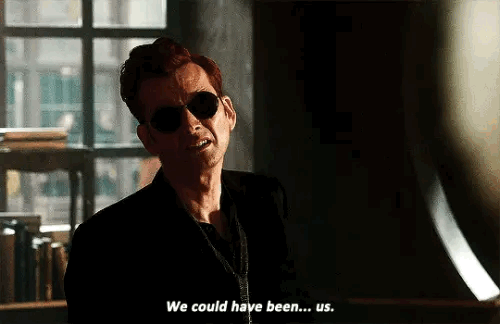
It’s over.
Crowley knows it’s over, white knuckles clutching the wheel, body shaking.
The Bentley doesn’t agree. She wants to hear nightingales. She wants the passenger seat to be filled.
Crowley doesn’t know what he wants anymore.
Of course he wants Aziraphale. He’s all he wants. Has ever wanted.
But everything is wrong now.
Crowley knows he’s not enough. Has never been enough. He knows “our side” was a sweet fantasy, something Aziraphale would nod along to as a stand-in for the side he really wanted.
Crowley knows, and has known, every time over the last 6000 years that he’s woken up alone.
It’s not fucking fair, he realizes, slamming on the brakes.
Maggie and Nina get time. They get to come back to each other when they’re ready.
Crowley doesn’t get time.
Gabriel and Beelzebub, of all people, get a happy ending. Get HIS happy ending.
The angel and the demon, run away to the stars, their eternity a blank story they get to write together. That’s what he and Aziraphale should have had.
Could have had.
Crowley sits in his car, feeling alone in a way he hasn’t felt since that awful time between falling and the garden. He’s an angel-less demon once again.
They could have been having breakfast at the Ritz right now, toasting “to the world.”
Except, it’s not breakfast time. It’s dark. Crowley’s been driving for Satan knows how many hours.
And, of course, Aziraphale will never go out for a nice breakfast with him again. Not after what happened.
He can’t stop replaying it in his head, looking for what went wrong.
Maybe Crowley should have tried harder. Maybe if he’d spoken first. If he had just kept bargaining. If he hadn’t fucking kissed him-
Crowley can’t breathe.
He’s crying now, shaking and gasping and parked in the middle of the empty road. He doesn’t know where he is. He doesn’t know where he’s going.
Crowley doesn’t know shit about a world without Aziraphale in it.
Against his better judgment, he remembers.
He remembers the stars. The garden.
He remembers the flood, and Job’s basement.
He remembers oysters and crepes, wine and poison and sweet warm cocoa in an angel-wing mug.
He remembers the ducks and the park and Aziraphale’s smile, his laugh, his wings, his hands.
He remembers Warlock and Anathema and the children on the boat and the children at the airbase and Job and Jesus and Muriel, Maggie and Nina and Newt and Nazis, angels and demons and humans and so many people over so many centuries who’d assumed, like Crowley, that he and the angel would just…work out some day. Would just happen.
They, like him, had just assumed that maybe the angel would love the demon just as fiercely as the demon loved the angel.
Crowley loves Aziraphale.
He can’t stop crying now, pathetic and messy and scared.
There is no Crowley without Aziraphale.
Aziraphale is gone. Who is Crowley?
The books will be sold. The coffee will be served. Heaven and Hell will keep running. Earth will spin. Humans will be born and will die and will love and learn and lose and win, and Crowley will still be alone.
It’s so unbearably….unbearable.
Being alive is so lonely.
He puts his foot on the gas.
The car, the plants, and the demon are speeding into the night, going somewhere, anywhere but here.
(read on ao3 here)
#nic writes#gos2 spoilers#angst#ineffable husbands#ineffable husbands fanfiction#good omens#good omens season 2#good omens fanfiction#fanfiction#crowley pov#the bentley#hhhhhh im not very tickety boo
176 notes
·
View notes
Text
Something Dark or Death
So there is that scene in episode 5 where Crowley says to Nina:
"Give me coffee or give me death. Funny name for a coffee shop."
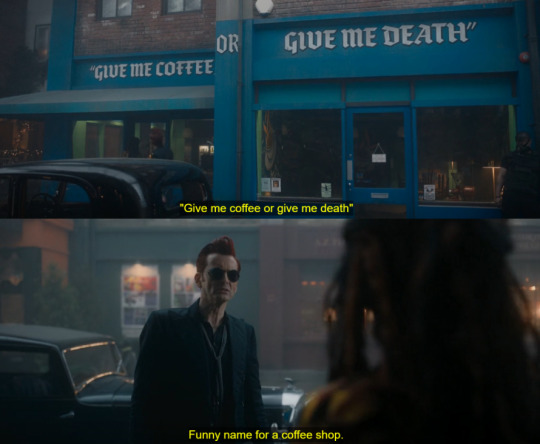
It's a strange time in the series to mention that now.
So I did what I always do when it comes to Good Omens at the moment… I look at the timestamp of the episode, when a suspicious line is spoken, and search for a fitting Bible verse with that number.
Here it is at minute 22:10. And this is the Bible verse (Revelation 22:10):
"Then he told me, “Do not seal up the words of the prophecy of this scroll, because the time is near."
It's from the Book of Revelation, you know, the prophecies of the last days before Christ’s return. The Second Coming.
So this sentence is important. I'm sure there is more to find and possible links to other metas. But for now, I want to focus on the funny name of the coffee shop.
Give me coffee or give me death.
I say Neil loves words and their meanings. And Bible-related numbers.
So let's focus on the word "coffee". Why coffee? There could be any other shop, but without coffee, the hints that Neil wants to give us wouldn't work, I assume.
Coffee
-from Arabic قَهْوَة (qahwa, “coffee, a brew”)
-The "coffee" sense is ultimately of disputed origin. (…), the original meaning could have been "dark stuff," related to Hebrew כָּהָה (“dull, weak, dim”)
This post https://www.tumblr.com/gallup24/732418097410146304/the-clue-behind-them by @gallup24 introduced me to "The Exhaustive Concordance of the Bible" by James Strong. In short: it's a word index to the Bible. (It was used in season 1 for the room number of the hellhound = 2549, which is Strong's Number for "kakia" - meaning "wickedness", "evil").
According to Strong's Concordance, the Hebrew word כָּהָה (dark stuff) has the number 3543.
You want to see what's going on at minute 35:43 of each episode in season 2?
Here you go:

Episode 1 = BEELZEBUB: No, it exists. Extreme sanctions.
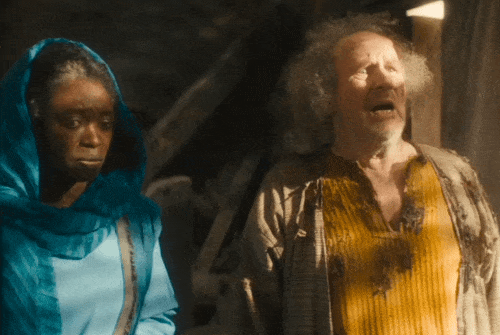
Episode 2 = JOB: Our children are dead?

Episode 3 = CROWLEY: Yes, whatever happened to him?
AZIRAPHALE: He left Edinburgh in disgrace. And then he killed himself.
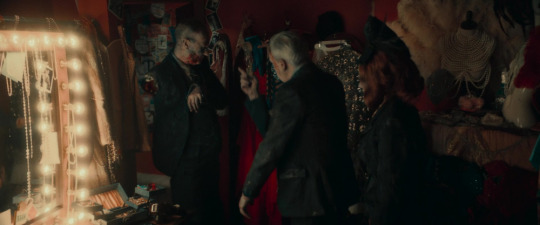
Episode 4 = (The Nazi Zombies leave the backstage room. Also their last scene in this season.)
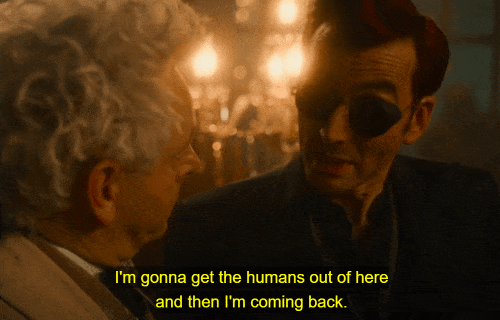
Episode 5 = The sentence starts at 35:42 but the second half is on point with the word "humans".
CROWLEY: (I'm gonna get the) humans out of here and then I'm coming back.
(This scene is about saving the humans from death, because Shax was ready to "(..)hurt them indirectly. We can definitely hurt them whilst battling angels. They'd be civilian casualties.")
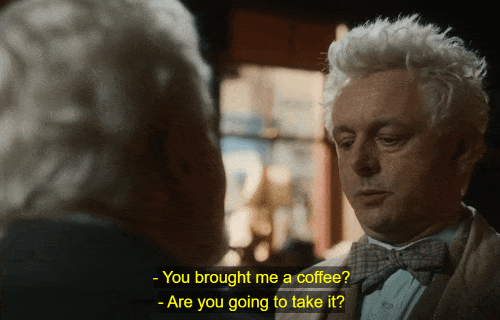
Episode 6 = AZIRAPHALE: You brought me a coffee?
METATRON: Are you going to take it?
And this.. reads to me as a death threat.
I don't think Aziraphale had a choice.
Maybe he thought that by accepting the Metatron's coffee and his offer to come back to heaven, he could prevent the "give me death" part. But he gets both.
The coffee means death. And not taking the coffee also means death.
Nina should rename her shop to "Give me coffee AND give me death."
#Take the coffee#and you get death anyway#good omens#good omens meta#good omens spoilers#good omens season 2
99 notes
·
View notes